Nov 2015 2nd Edition
Nov 2015 2nd Edition Estelle Greeff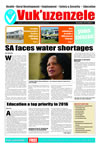
Translations
SA faces water shortages
SA faces water shortages andileWater and Sanitation Minister Nomvula Mokonyane has called on citizens to use water sparingly and responsibly because climate change has worsened the drought situation in the country.
The Minister also called on local government and those responsible for managing water to lead communities in using water wisely.
“South Africa is a water scarce country with highly variable rainfall and water runoff. To mitigate this situation, this requires pro-active and responsive risk management, coupled with innovative water security management interventions,” said the Minister Mokonyane.
She explained that 98 per cent of the water in the country has already been supplied and it has to be reused. South Africa has had to draw some of the water from Lesotho.
Drought conditions are being experienced across the country due to prolonged lower-than-normal rainfall since the beginning of the year, and this has led to water shortages in a number of public water supply schemes or dams.
“So far, drought disaster has been declared in only two of the nine provinces … which are KwaZulu-Natal and Free State. Funding for specific drought mitigation measures have been received by only KwaZulu-Natal,” she said.
Minister Mokonyane added that other drought stricken areas included the southern parts of Mpumalanga and selected areas in Limpopo, North West and Northern Cape provinces.
Limpopo’s Provincial Executive Council has declared the province a disaster area through national prescripts.
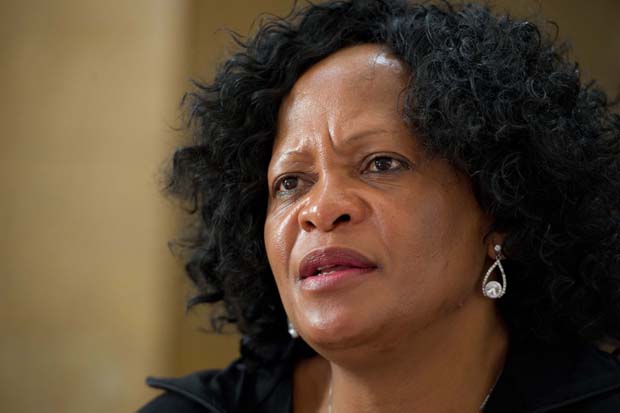 A thorough assessment of the draught situation found that all District and Local Municipalities in Limpopo are facing the worst draught conditions recorded in years. The declaration will help the Government to unlock the necessary resources to assist the affected communities.
A thorough assessment of the draught situation found that all District and Local Municipalities in Limpopo are facing the worst draught conditions recorded in years. The declaration will help the Government to unlock the necessary resources to assist the affected communities.
Currently, the Limpopo Department of Agriculture and Rural Development has set aside R3 million to assist affected farmers through the provision of livestock feed. However, this amount does not cover other areas such as human consumption.
About 50 per cent of local water storage was a problem and could become critical if they are not managed carefully.
“The drought currently affects 173 of the 1 628 water supply schemes nationally, serving approximately 2.7 million households or 18 per cent of the national population,” she said.
Measures to mitigate drought
Minister Mokonyane said to address and lessen the potential impact of drought there were immediate, medium- and long-term measures being put in place.
These include:
- strict implementation of drought operating rules at all dams
- increasing the water mix especially groundwater utilisation, rain harvesting
- re-use of return flows and packaged desalination plants
- reducing operational risks by proper infrastructure operation and maintenance with associated skills development
- implementation of water conservation and demand management programmes and climate research as well as hydrological and geo-hydrological monitoring.
“The department has committed R352.6 million to the initial drought intervention projects and a further R96.620 million to interim tinkering and additional interventions,” said Minister Mokonyane.
Provincial water levels
Free State
The Free State is generally in a positive water balance with the average dam water level at 67 per cent, but critical water areas are the central areas along the watershed relying on the water transfers from the Caledon River system.
“This system has experienced abnormally low flows in recent years. Water restrictions have been implemented for users in the Caledon River system, and releases from the Lesotho Highlands transfers into the Little Caledon River are being implemented to augment the system in the short-term,” said the Minister.
Northern Cape
In the Northern Cape a total of 280 communities depend on groundwater because the province is located in a semi-desert climate and experiences low rainfall.
“Many of these towns are already using over 76 per cent of groundwater, potential and alternative sources of water are being investigated to reduce the risk of non-supply of water,” she said.
The average water level in all dams in the Northern Cape is 53 per cent and water restrictions are currently being implemented.
Western Cape
In the Western Cape the average dam level is 70 per cent, which is low compared to last year because of lower-than-normal rainfall during the past winter.
Main drought impacts are on agriculture in the Vredendal, Garies, Bitterfontein areas, where the farmers have already applied for drought relief for their stock.
Gauteng
Most of Gauteng’s water is supplied by the Vaal and Crocodile West River systems. Minister Mokonyane said the average dam levels are currently at 84 per cent and pose manageable short-term water security risk.
“No hydrological drought is experienced currently. A number of projects are however underway to address service delivery problems,” she said.
The restrictions that have been implemented by Rand Water are as a result of the current high weather conditions, which could lead to a drought situation. The City of Tshwane implemented water restrictions in most towns due to the heat wave in October. While Joburg Water had not yet implemented water restriction, communities have been advised to use water wisely.
Eastern Cape
In the Eastern Cape, the water situation is generally good with average dam level at 78 per cent and most of the key dams are at full or close to full levels.
However, the Minister said there were areas of concern including Butterworth/Idutywa.
“Water restrictions should be implemented urgently to stretch the available water in the system.”
Limpopo
The average water level of dams in Limpopo is 71 per cent with 12 of 24 dams above 80 per cent and four dams below 50 per cent. The recent construction of the De Hoop Dam is expected to bring relief to the rapid growth in mining and domestic water demands in the Sekhukhune District Municipality.
The Minister said the department will intervene in addressing challenges in Limpopo, to help local government to manage them.
Mpumalanga
In Mpumalanga, dam water levels are on average at 70 per cent. Minister Mokonyane said the drought stricken area is primarily located in the south bordering KwaZulu-Natal and Swaziland.
“Despite below average rainfall, the domestic water supply systems are still in good state,” she said.
KwaZulu-Natal
In KwaZulu-Natal the average water level of the dams is currently 58 per cent of full supply capacity. Three of the 18 large water supply schemes are at risk, and 42 of the 117 schemes are affected by drought.
“A plan of action has been developed, including drilling of boreholes, spring rehabilitation and packaged desalination plants. More than 150 tankers have already been deployed in 12 local municipalities," said the Minister.

Education a top priority in 2016
Education a top priority in 2016 andileAccess to quality education is set to get a major boost in 2016 as the Department of Basic Education (DBE) implements initiatives aimed at improving education.
Plans are underway to ensure that learners learn African languages in schools next year, as part of the department’s plans to promote the use of African languages.
Minister Angie Motshekga said the Incremental Introduction of African Languages (IIAL) will be implemented across the country.
“The 2016 school year will see the department implementing two initiatives aimed at improving the quality of education.
“We are going to roll out a pilot for IIAL to promote and strengthen the use of African languages, by introducing learners incrementally to learning an African language from Grade 1 to 12. This will ensure that all non-African home language speakers speak an African Language,” explained the Minister during an interview with Vuk’uzenzele.
Schools that previously only taught English and Afrikaans will offer and indigenous African language from Grade 1 next year.
So far the department has developed printed material and will be delivering Learner Teacher Support Material (LTSM) in the language chosen to all schools for the implementation of IIAL in 2016.
Introduction of Operation Phakisa ICT in education
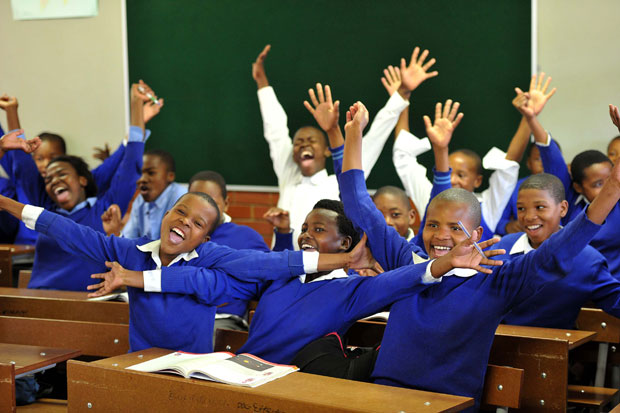 In October President Jacob Zuma launched Operation Phakisa Information Communications Technology (ICT) in Education.
In October President Jacob Zuma launched Operation Phakisa Information Communications Technology (ICT) in Education.
Operation Phakisa is modelled around the Big Fast Results methodology that was first applied by the government of Malaysia to address its national key priority areas such as poverty, education, crime and unemployment.
It involves setting up clear targets and following up with an ongoing monitoring process, which makes the results public. Through this initiative the Malaysian government registered impressive results within a short period.
Minister Motshekga said the implementation of Operation Phakisa ICT will improve the quality of education and simplify some of the administrative processes.
“ICT will help us in many ways. It will help in the curriculum, at an administrative level, because at times getting administrative information is a big problem.”
One of the benefits of an initiative like Operation Phakisa is the speed at which things happen. If it is implemented properly, it can speed-up the issuing of results.
“If we can do the Annual National Assessment (ANA) through the ICT we can have the results overnight, because if learners write exams using computers we will get real-time results.”
ICT is a term that includes any communication device or application, including radio, television, cellular phones, computer and network hardware and software and satellite systems.
School infrastructure
To address the backlog of school infrastructure, especially in the predominantly rural provinces, the department will, under the Accelerated Schools Infrastructure Delivery Initiative (ASIDI), continue to eradicate the backlog in schools without water, sanitation and electricity and to replace those schools constructed from inappropriate material (mud, plankie and asbestos).
2015 National Senior Certificate (NSC)
The 2015 school year saw the highest number of candidates sitting for the Grade 12 exams, with over 800 000 candidates, 10 million question papers, 7 000 examination centres, 65 000 invigilators, 35 000 markers and over 100 marking centres.
Minister Motshekga said the increased number of candidates is an indication that government is making strides in making education accessible.
“The figures involved in this year’s NSC examinations are remarkable. This is indicative of the fact that we are retaining more learners in the system and improving access to education.”
Developing teachers for the future
Minister Motshekga said that last year her department focused its attention on teacher development.
“In a bid to ensure that we have the correct teacher, teaching the correct subject in front of the class at all times, we have embarked on an across the system teacher profiling exercise.”
In addition, the department has relaunched teacher training centres.
“We have relaunched 131 fully functioning teacher training centres, of which 60 are fully ICT compliant thanks to the Vodacom Foundation’s sponsorship.
“In order to develop teachers for the future we awarded over 14 349 Funza Lushaka Bursaries in the 2014 academic year alone. During the year under review we appointed a record number of 3 875 qualified educators who are under the age of 30.”
QUICK FACTS ABOUT ASIDI
129 schools have been completed to date:
-
92 in the Eastern Cape
-
20 in the Western Cape
-
six in the Free State
-
fi ve in Mpumalanga
-
three in Limpopo
-
two in the North West
-
one in the Northern Cape
School infrastructure:
-
499 schools have received water for the first time
-
425 schools have received decent sanitation for the first time
-
289 schools have been connected to elecricity for the first time
Violence is not the answer
Violence is not the answer andile
What business does a 10-year-old child have shoving a burning tyre towards the middle of a street?
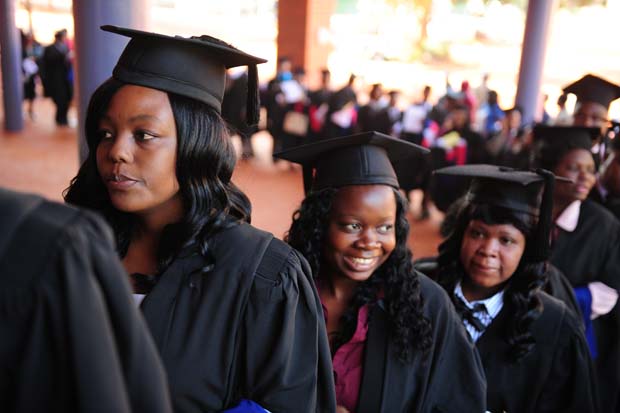 Or why would a university student protesting about study fees be smashing the window of a passing vehicle to injure a motorist who is trying to leave the scene of the protest?
Or why would a university student protesting about study fees be smashing the window of a passing vehicle to injure a motorist who is trying to leave the scene of the protest?
What is the sense of burning down a library when a community is unhappy about an aspect of housing in the area?
It is important for all South Africans to reflect on these questions as examples of unlawful and undesirable behaviour in our democratic society where there can be no comparison between the government of today and the apartheid state.
In addressing grievances to government or public authorities, there is no justification for anyone to claim that “we will treat this government like we treated the apartheid government”, as is threatened from time to time.
We know from our history and relatively recent experience that the apartheid state paid no attention to the voice of the majority of South Africans.
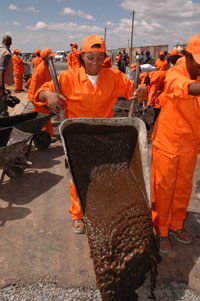 The apartheid state did not allow us to put our ideas or grievances to elected public representatives and in fact there were no representatives elected by ourselves such as councilors, mayors, MECs, Premiers or Ministers. The apartheid state did not invite the majority of us to comment on proposed laws or regulations for 30 days.
The apartheid state did not allow us to put our ideas or grievances to elected public representatives and in fact there were no representatives elected by ourselves such as councilors, mayors, MECs, Premiers or Ministers. The apartheid state did not invite the majority of us to comment on proposed laws or regulations for 30 days.
The apartheid state did not invite us to public consultation sessions. The apartheid state provided no imbizo for us to make our voices heard. The apartheid state did not have portfolio committees and other forums where we could be heard.
Instead, the apartheid state was constantly on the defensive, waiting to send in the dogs, the Casspirs, the roadblocks, the teargas and the undercover security police to quell protest and apprehend leaders of our people’s resistance.
The defeat of the racist and brutal apartheid regime paved the way for the many positive changes we have recorded in our democratic dispensation since 1994.
Since 1994, nearly 5,000 farms, comprising 4.2 million hectares, have been transferred to black people, benefiting over 200,000 families.
In addition, nearly 80 000 land claims, totaling 3.4 million hectares, have been settled and 1.8 million people have benefited.
 Also since 1994, more than 16 million people especially older persons, vulnerable children and persons with disability have been given much needed social grants to alleviate poverty.
Also since 1994, more than 16 million people especially older persons, vulnerable children and persons with disability have been given much needed social grants to alleviate poverty.
The Public Works and Community Work programmes had created six million work opportunities for unemployed people, 40 per cent of them young people, by 2014.
Over 3.3 million free houses have been built, benefiting more than 16 million people.
Nearly 500 informal settlements have been replaced with quality housing and basic services.
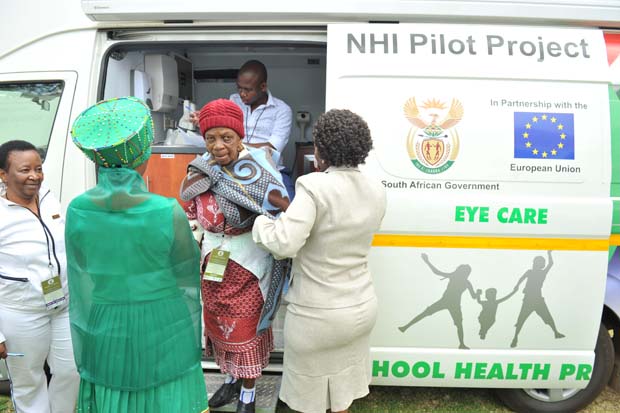 About 12 million households have access to electricity, seven million more than in 1994.
About 12 million households have access to electricity, seven million more than in 1994.
Around 92 per cent of South Africans had access to potable water last year, compared to 60 per cent in 1996.
We continue to invest in our children’s education which is an investment into the future.
Over seven million learners from poor households do not pay school fees. Over seven million receive free meals at school.
Every province in our country now has a university.
Funding for students from poor families through the National Students Financial Aid Scheme (NSFAS), has increased from R441 million in 1997 to more than R9.5 billion in 2015.
Many more examples of progress in our country can be cited, but the point here is to illustrate the clear contrast between a developmental, democratic state in 2015 and the repressive regime we swept out of the way in 1994.
Given this evidence and the fact that our democracy gives us Parliament, the courts and various other bodies where citizens can take their grievances, we cannot excuse the death, injury and destruction we see on our streets.
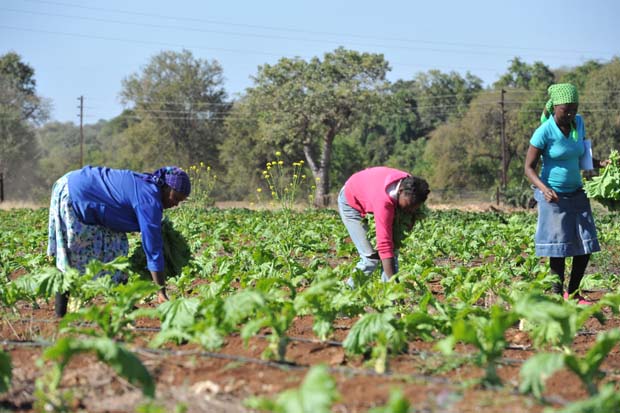 People will say they want delivery but then destroy the things that have already been delivered – creating new shortages and disadvantage in the process.
People will say they want delivery but then destroy the things that have already been delivered – creating new shortages and disadvantage in the process.
Two decades ago and more we had no choice but to respond to the brutal apartheid regime with violence. But none of that applies today in a peaceful and democratic South Africa.
We cannot raise new generations of children to believe that burning tyres, throwing stones at freight trucks, overturning refuse bins or killing criminals through mob violence is normal and acceptable.
The more we make ourselves perpetrators, the more we increase our chances of becoming victims of such violence ourselves. We must say no to violence.
We must say no to leaders who incite violence and we must report violence to the authorities, rather than be a part of it. The violence must stop.
Cornubia housing project receives additional funding
Cornubia housing project receives additional funding andileLocal government
The eThekwini Municipality has ploughed an additional R101 million into the first phase of the Cornubia Integrated Human Settlement Development to ensure its completion.
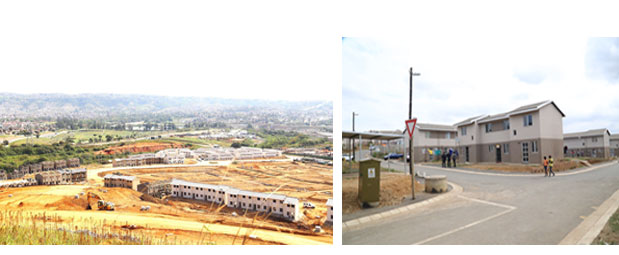 The funding will ensure completion of the eight sub-phases in Phase 1, of which one, Phase 1B, is already at implementation stage.
The funding will ensure completion of the eight sub-phases in Phase 1, of which one, Phase 1B, is already at implementation stage.
Attempts to find solutions to address the shortfall were reviewed and included seeking additional funds to make up the shortfall or reducing tender prices.
eThekwini Municipality City Manager Sibusiso Sithole said funding had to be approved to ensure that the City was able to meet its housing obligations.
“There is a sense of urgency in this matter as we have been dealing with it for months,” he said.
There are ongoing discussions between the municipality and the national and provincial government to ensure funding for human settlements is prioritised.
The R25 billion Cornubia housing and industrial project is a mixed-use, mixed-income, 1 200-hectare development, with 80 hectares earmarked for industrial development and the rest for commercial, housing and other social and public facilities, including schools, crèches, clinics, multi-purpose halls, police stations and post offices.
The project will target low, middle and upper income earners and will also include an industrial and commercial project that will provide residents with employment opportunities on their doorstep.
Once complete, the project will deliver close to 30 000 housing units and provide shelter to over 100 000 people.
The high-rise structures are similar to starter homes and consist of two bedrooms, a bathroom and toilet and as an open plan kitchen with lounge.
Last year more than 151 families, the majority from informal settlements, were relocated to Cornubia from various parts of the city.
Sthembiso Shezi, a visually impaired young man, was relocated with his wife and two kids to their new home.
“I am grateful for the housing opportunity given by government. Since the relocation I have registered a cooperative construction company, which has started to work and is helping me to support my family.”
Nigel Gumede Chairperson of the Human Settlements and Infrastructure Committee at the eThekwini Municipality said there is a demand for housing in the municipality and government has the responsibility of providing the service.
“We have identified a need and we must keep moving to provide this service,” he said.
Primary School for Cornubia’s residents
Learners living in Cornubia have access to education on their doorstep. Blackburn Primary School moved from a building owned by Tongaat Hulett in the informal settlement of Blackburn to a new premises in Cornubia.
Cornubia Housing Project :
-
The project is expected to deliver close to 30 000 housing units and provide shelter to over 100 000 people.
-
R25 billion is the total cost of the Cornubia housing and industrial project.
-
About 270 learners from Grade R to Grade Six attend Blackburn Primary School, located within Cornubia. This number is expected to increase to 600 next year.
The move, which took place recently, was funded by the Department of Education. The school’s relocation enables easier access for the large numbers of children living at the Cornubia housing project.
The new prefabricated housing accommodates 270 learners from Grade R to Grade Six and has seven teachers.
By next year the school, which has 24 classrooms, is expected to have between 500 and 600 learners and new teachers will be appointed to cater for the higher numbers.
“The move to the new school took place midway through the school year. Many of the children living in Cornubia had already enrolled at schools in surrounding areas. We are expecting them to move here next year as it is much closer and more convenient for them,” said Kevin Sevlall, the headmaster of Blackburn Primary School.
Sevlall said that the school is adjusting well to its new premises and that 52 children are attending the crèche, a larger number than at the previous premises.
“Many of the children are attending school for the first time and are enjoying their new learning experience,”
Sevlall said. Sevlall is hoping to set up a library at the new school, which will give learners the opportunity to further their education.
“The school is also a useful and accessible community resource outside of school hours, as a nearby church and community members make use of the facilities. ABET literacy classes are given in the evenings.”
Human Settlements Minister Lindiwe Sisulu announced recently that international property investor, Investec Property, will build an 85 000 sqm shopping centre at the Cornubia housing project.
* Gugu Mdlalose works for eThekwini Municipality.
New house brings dignity and joy to family
New house brings dignity and joy to family andileLocal government
Christmas came early this year for Poppy Mabena (56) and her seven grandchildren.
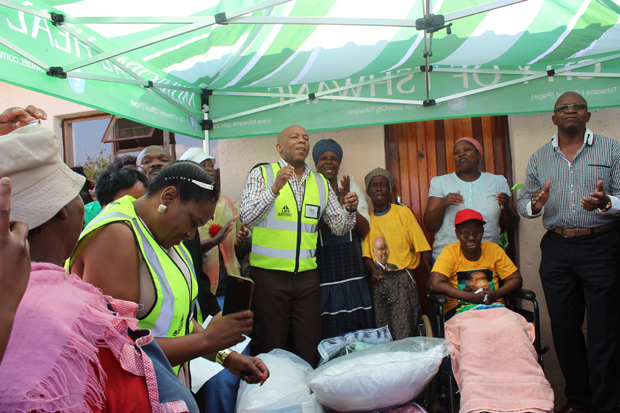 The disabled woman had been living in a two-roomed shack for a long time. During the rainy season, the shack would get flooded and the family’s biggest fear was that it would collapse on them one day.
The disabled woman had been living in a two-roomed shack for a long time. During the rainy season, the shack would get flooded and the family’s biggest fear was that it would collapse on them one day.
“I remember one rainy day very well. We all had to stand on top of the table because the shack was flooded and we could not sleep,” said Poppy’s 22-year-old granddaughter, Phumzile Sonto Mabena.
Now the family is able to sleep comfortably in a newly built five-roomed house and Poppy is able to live a normal, dignified life with her grandchildren.
“I feel great at the moment, I don’t know what to say. I’m thankful to the mayor and all the people who played a role in building this house,” she said fighting back tears.
The home has a ramp, two bedrooms, kitchen, lounge, dining room and a toilet. The ramp was installed to make movement easy for Poppy, because she uses a wheel chair.
The house was built as a result of a partnership between the City of Tshwane and private companies Jabulile Construction CC and Super Grand Agri Feed Cooperative.
Speaking during the handover Executive Mayor of Tshwane Kgosientso Ramokgopa said it is important for all sectors of society to work together because government alone cannot deal with all the challenges facing communities.
“We all have to work together including faith-based organisations, the youth, government, private sector and local businesses. If we all pull in the same direction there is nothing that we can’t achieve,” he said to loud cheers from a packed community hall in Section F of Ekangala, in Bronkhorspruit, east of Pretoria.
Ramokgopa added that the handing over of a new house will not be the only event taking place in the area.
“Our visit to Gog’ Mabena’s house is not the last time we will come to Section F. We will come back and make some major announcements about plans we have for this place.”
He added that plans to construct a mall in Ekangala were at an advanced stage.
Construction of the house started on July 18 as part of honouring the legacy of former President Nelson Mandela.
Upcoming housing and human settlement projects in Tshwane :
- The City, together with the Gauteng Department of Human Settlements, has identified mega projects, with a potential to yield more than 10 000 housing units in the next five years.
- The R36.9 billion mega projects programme in Tshwane will result in the development of approximately 180 875 housing units in the next five years.
- A mixed-income housing development taking place north of Tshwane that will cater for low- to middle-income groups. The development will yield 16 000 housing units, 1 300 of which will be RDP houses. It comprises six residential-zoned townships that will be built over seven years, with an estimated capital investment of R3.5 billion.
- Another R5 billion mixed-housing development, being undertaken by a private developer, consists of 14 000 housing units to be produced over eight years in the Centurion area of Monavoni, which includes 1 400 RDP houses.
- The City is partnering with various social housing institutions to provide affordable rental housing. A total of 5 355 affordable rental accommodation units, spread across Tshwane, are at various stages of planning.
Source: State of the Capital Address
Minister Zwane hands over houses
Minister Zwane hands over houses andileMineral Resources Minister Mosebenzi Zwane spread some joy in Lephalale, Limpopo, when he handed over houses built for mineworkers.
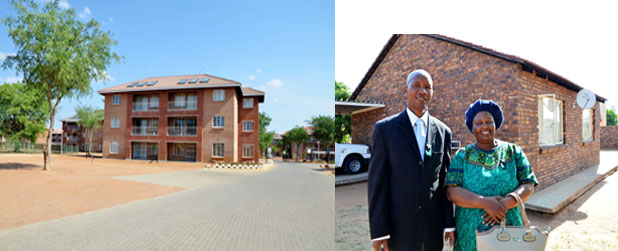
The houses are part of Exxaro’s Grootegeluk coal mine’s Social and Labour Plan (SLP) commitment.
An SLP is a prerequisite for the granting of a mining or production right under the Mineral and Petroleum Resources Development Act (MPRDA).
The R590 million Lephalale Housing Project consists of units that are available to rent and to buy, creating a sustainable town.
The Lephalale Housing Project consists of units that are available to rent and to buy, creating a sustainable town.
“The Mining Charter requires companies to facilitate home ownership options for mine employees. I wish to congratulate this mine for selling 608 company-owned houses and 113 plots of land to employees and the public,” said Minister Zwane during the official handover of the completed houses.
The housing project is in line with revitalising distressed mining communities.
President Jacob Zuma appointed an Inter-Ministerial Committee (IMC) shortly after the Marikana tragedy in which over 44 people lost their lives during labour unrest at the Lonmin Mine in the North West in 2012.
The IMC is tasked with overseeing the process of ensuring that mining towns are transformed and uplifted, and that there’s improvement in the living and working conditions of mine workers.
The Lephalale Housing Project began in 2009 and more than 160 houses were built along with 579 flats.
“The conversion of hostels into single room units is indeed welcomed. I am also pleased that the houses will not only benefit mine employees but also community members, so that we begin to create more integrated communities,” said Minister Zwane.
Lephalale Housing Project:
The total cost of the project was R590 million. 160 houses built. 579 flat units built.
Better living conditions for miners
Mine worker Petros Thako (63) said it was a dream come true for him to be able to live with his wife on the mine.
“I have been working for Exxaro for 30 years. Before we moved into the new units we were staying in hostels. The difference with living in the new apartments is that there is privacy and I can live with my wife.
“In the old hostel I used to share a small one room space with another person,” said Thako.
Thako, who originates from Mokopane, pays R425 per month to rent a bachelor unit.
He also receives housing subsidy from the mine.Enoch Sepoloane, also working at the mine, opted to buy a three-bedroom home from the mine, which he shares with his wife and six children.
Sepoloane also agrees with Thako that, as a miner, he did not think he would be able to live with his whole family on the mine.
“Whenever I experience any difficulty at work I am happy that at the end of the day I get to go home to my family.”
Johan Wepener General Manager for Exxaro said the company was receiving very positive feedback from the workers.
“Most workers are coming to us and saying the new housing units are a massive upscale to what they had before.”
“We will try and continue to build habitable accommodation for mine workers.
More houses on the cards
Exxaro has also unveiled the Extension 86 housing project, also in Lephalale.
Wepener said most of the groundwork to start the construction of the houses has been done.
“Four types of houses will be built and the sizes will range from 45 square metres to 120 square metres, based on affordability, because we are targeting the lower end income workers.”
He said local contractors will be used to build the houses to create jobs in the area.
“About 80 per cent of resources used during the project will be from the local community.
“The first phase of the development will consist of 50 units that will be built and sold to the people. As interest grows we will increase the number of units on an annual basis.”
This section phase of the housing project is expected to be completed in 2019.
Joburg’s digital revolution
Joburg’s digital revolution andileLocal government
The City of Johannesburg is strengthening efforts that will ensure that residents did not have regular access to the internet, this as the city plans to roll out 1 000 wi-fi hotspots – a process that is expected to be completed by 2016.
 The planned roll out phases will include key public areas within the Regions such as Zandspriut, Diepsloot, Orange Farm, Ivory Park, Pennyville, Lenasia and Ziberfontein to name just a few.
The planned roll out phases will include key public areas within the Regions such as Zandspriut, Diepsloot, Orange Farm, Ivory Park, Pennyville, Lenasia and Ziberfontein to name just a few.
Mayor Tau first announced the R80 million Jozi Digital Ambassadors Programme during his 2015-2016 State of the City Address in May.
The recruitment and assessment of 3 000 digital ambassadors has begun and is being effected through Vulindlel’ eJozi, a programme initiated in partnership with non-governmental organisation Harambee Youth Employment Accelerator to break down barriers to youth employment.
Vulindlel’ eJozi, is a programme designed to break down barriers to opportunities by creating pathways for young people to access skills training programs and entry level employment.
The City runs the Jozi Digital Ambassadors Programme in partnership with the University of Johannesburg.
“We’re a city where the young lead the call for transformation, demanding the opportunity to work, improve their lives and become the best of what they can be. As the City of Johannesburg we know and understand that with just a little help, our youth are not the challenge some think them to be, but our greatest asset.
“This is why we are investing so much in the youth of this city. This is in line with our developmental local government approach to the implementation of the 2040 Growth and Development Strategy,” said Mayor Tau.
The programme will use a new City portal called Maru a Jozi, a Setswana phrase for “Joburg clouds”. Maru a Jozi is an easy-to-use portal that enables one free access to a range of basic online services. Each digital ambassador will be equipped with a tablet to train community members. They will also be mentored in business acumen to enable them to use technology to create innovation for their own enterprises.
Mayor Tau said the City was not only empowering people with digital knowledge and understanding but was also addressing the fact that half of Johannesburg’s 4.8 million residents did not have regular access to the internet. University of Johannesburg’s Professor Johan Meyer said the programme would “enable the broader Johannesburg community to engage with digital technology, for example, in online job seeking opportunities, banking applications and access to digital services”.
Source: www.joburg.org.za
The City of Joburg plans to roll out more than 1 000 Wi-Fi hotspots throughout the city.
New ambulances for efficient health care services
New ambulances for efficient health care services andileFaster and more efficient access to health facilities is now a reality for communities in Limpopo following the handover of ambulances to hospitals in the province.
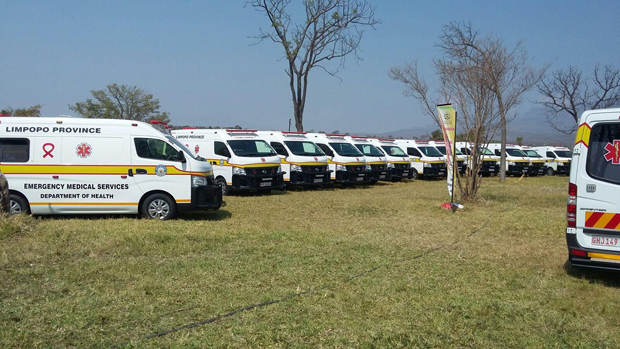 Premier Stanley Mathabatha and the MEC of Health Dr Phophi Ramathuba recently handed over 60 brand new ambulances, four forensic vehicles and a fully equipped laundry to Sekororo Hospital.
Premier Stanley Mathabatha and the MEC of Health Dr Phophi Ramathuba recently handed over 60 brand new ambulances, four forensic vehicles and a fully equipped laundry to Sekororo Hospital.
The Department of Health recently acquired 100 new ambulances. The arrival of the new fleet will ease the burden of the shortage of emergency medical services (EMS) vehicles, as a result of the existing aging fleet.
The new vehicles aim to ensure that the province eventually meets the national EMS norms regarding a response time of 15 minutes in urban areas and 40 minutes in rural areas.
Limpopo is largely rural and the ambulances are expected to ease the challenges faced by people from far-flung areas.
“The province made an assurance during the departmental budget speech earlier this year to prioritise the procurement of ambulances so that the people of Limpopo benefit from these services and their quality of health is improved,” said Premier Mathabatha.
“This is the first batch of ambulances acquired and the rest will be delivered later, as committed in the 2015/16 departmental budget vote.”
“The arrival of these ambulances will certainly have a positive impact in the lives of the people of Limpopo and lessen the challenges experienced by communities regarding emergency medical services.”
The ambulances will be shared among all five provincial districts.
Some of the new ambulances will be converted into obstetric ambulances to ensure that women in labour reach health facilities in time to deliver their baby safely.
The special obstetric ambulances differ from other ambulances in that they meet the specific demands of a pregnant mother and carry equipment needed in case a mother gives birth in transit.
Having such ambulances in health facilities came about after Health Minister Dr Aaron Motsoaledi launched the Campaign for Accelerated Reduction of Maternal Mortality in Africa in 2012.
At the time he recommended, among other things, the procurement of obstetric ambulances, which will help to reduce maternal mortality and achieve universal access to reproductive health.
Milk banks for newborns
Milk banks for newborns andileHuman milk banks are quickly becoming a solution following calls to promote breastfeeding in South Africa.
The KwaZulu-Natal (KZN) Department of Health recently opened its seventh human milk bank at the Lower Umfolozi War Memorial Hospital in Empangeni.
A human milk bank is a storage, processing and distribution facility for donated human milk. The milk is usually used to help orphaned and sick infants and babies who live with guardians and therefore can’t get milk from their biological mother.
The country has about 50 public and private hospitals that have human milk banks.
Speaking during the opening of the milk bank in KZN, MEC for Health Dr Sibongiseni Dhlomo said that no baby should be left vulnerable just because their mother cannot breastfeed.
“As a department we firmly believe that an investment in the health of children is an investment in the future of the nation. We have committed to do everything possible to provide all necessary help for babies in their first 1 000 days of life.
“Optimal nutrition during this period is critical to ensuring optimal child health, growth and development.”
MEC Dhlomo said the KZN Department of Health is speeding up the establishment of human milk banks, which have been identified by the World Health Organisation as important in promoting breastfeeding to address childhood malnutrition and reduce neonatal morbidity and mortality.
He added that the establishment of human milk banks was a strategy to reduce infant mortality and came in response to the reality that some babies can’t access breast milk from their biological mothers for various reasons.
Before the human milk bank programme was launched infant mortality stood at 4.7 per cent (August 2012), but by January 2013 the mortality rate was zero.
 “Research has proven that breast milk is the perfect living food for infants as it meets the baby’s nutritional needs. It also protects the baby against infections.”
“Research has proven that breast milk is the perfect living food for infants as it meets the baby’s nutritional needs. It also protects the baby against infections.”
KZN has milk banks at Stanger Hospital, Grey’s Hospital, Edendale Hospital, Newcastle Hospital, King Edward VIII Hospital and at Ithemba Lethu in eThekwini.
“Experience has also shown us that without breast milk during their first two weeks of life premature infants, especially those with a low birth weight of less than 1.8 kg, are left wanting for antibodies. They then become vulnerable to infections and diseases that results in hundreds of them dying,” MEC Dhlomo added.
He said the decision to make Lower Umfolozi War Memorial Hospital the regional milk bank was to ensure that infants could benefit from the whole region, which consists of the uThungulu, Zululand and uMkhanyakude Districts.
MEC Dhlomo thanked the department’s partners in health PATH International for facilitating the donation of human milk bank equipment to the hospital.
The equipment includes one human milk bank pasteurising system, portable universal power supply and one freezer.
Why breast milk is important
According to the Department of Health the colostrum, which is the first yellowish milk the breast produces for the first three or four days after a baby is born, is regarded as the first immunisation because it is rich in protective substances that are important to protect the baby from various infections.
The Department of Health recommends that a child be given breast milk from birth to six months as it provides most of the nutrients that the baby needs.
Vulnerable infants in healthcare facilities are those who are unable to suckle or whose mothers have underlying health issues that make breastfeeding impossible.
Human milk banks fill this gap by ensuring that breast milk is handled and donated in a controlled and safe environment.
Correctional Services hosts Job Fairs Operation Hira
Correctional Services hosts Job Fairs Operation Hira Estelle GreeffOpportunities
Human Capital is a key ingredient in the administration of DCS. This is a labour-intensive organisation whose ability to realise its Vision, Mission and Strategic Objectives is directly related to the extent to which it is able to have the RIGHT PERSONS, at the RIGHT TIME, doing the RIGHT THINGS.
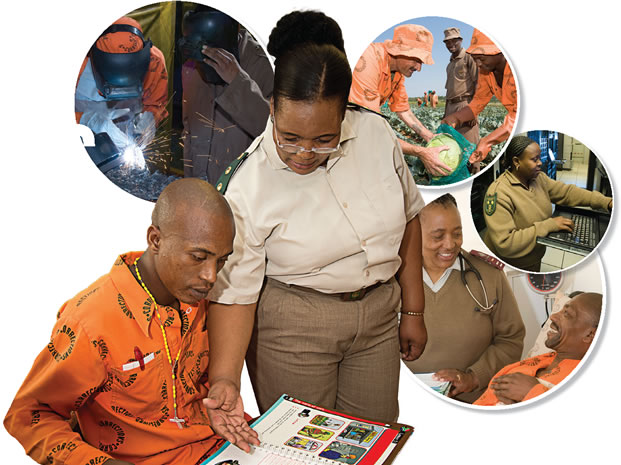 As part of its recently-launched Operation Hira campaign, the Department will be hosting Job Fairs as part of its ongoing efforts to intensify the recruitment of suitably qualified professionals to fill vacancies in the scarce and critical skills job categories in order to deliver on its mandate.
As part of its recently-launched Operation Hira campaign, the Department will be hosting Job Fairs as part of its ongoing efforts to intensify the recruitment of suitably qualified professionals to fill vacancies in the scarce and critical skills job categories in order to deliver on its mandate.
These Job Fairs will serve as a platform to highlight employment and career opportunities within the Department in the various professional fields of study.
The recruitment of these professionals will go a long way towards improving government’s capacity to deliver services.
Through this intervention, the Department is also responding to the call by government to create employment and thereby contributing towards the reduction of unemployment in the country.
The Department is therefore hereby inviting potential candidates to attend the Job Fairs. During the Job Fairs, applications will be processed, and qualifying candidates will be taken through preliminary interviews.
The Job Fair will commence at 08h00 and conclude at 17h00 on both days. Kindly note that access will be limited to applicants with qualifications in the identified occupations.
- Nurses (Operational Managers, Clinical – Primary Heath Care and General Professional Nurses)
- Educationists (AET, Mathematics, Science, Life Science, technical subjects and IsiZulu)
- Pharmacists
- Clinical Psychologists
- Chief Construction Project Managers • Artisans (Plumbers, Electricians, Welders, Boiler Makers, Fitter & Turners, Motor Mechanics, Painters, Upholstery, Bricklayers, Carpenters, Spray Painters, Wood Machinists, and Plasterers)
- Artisan foremen (Carpentry, Plumber and Bricklayer)
- Chief Artisans (Asset and Production workshop – Wood Machinists and Cabinet Makers)
- Medical Officers
- Social Workers
- Employee Assistance Practitioners (EAP)
- Technicians (Facilities)
- Supply Chain Management Specialists
- Legal Admin Officers
- State Accountants (Financial Accounting)
- Information Communication Technology Specialists (ICT)
- Engineers (Civil, Mechanical and Electrical)
- Internal Auditors (IT)
- Occupational directed Education and Training Development Practitioners (HRD practitioners).
The dates, venues and contact persons of the Job Fairs are as follows:
10 - 11 November 2015
KwaZulu-Natal at Sevontein Correctional Services located at KwaMafunze, Elandskop, Pietermaritzburg
Ms D Nzama @ 033 845 7307
Mr T Somaru @ 033 355 7365
12 - 13 November 2015
Gauteng at Johannesburg Correctional Centre located at No. 09 Main Road in Meredale
Mr T Magagula @ 012 420 0172
Mr C De Bruin @ 012 420 0181
19 - 20 November 2015
Western Cape at Goodwood Management Area, Montaque Avenue, Edgemead
Mr J Groenewald @ 021 550 6014
Ms M Sanders @ 021 550 6059
23 - 24 November 2015
Free State/Northern Cape at Bloemfontein City hall, Corner Charles and Nelson Mandela Street, Bloemfontein
Mr L Bikane @ 051 404 0282
Ms M Dooling @ 051 404 0242
26 - 27 November 2015
Eastern Cape, St Albans Management Area, Old Cape Road, St Albans
Mr S Twani @ 043 706 7840/34
Ms L Tyibilika @ 043 706 7833/34
2 - 3 December 2015
Limpopo/Mpumalanga/North West at Jack Botes Hall, Corner Church and Bodestein Street, Polokwane
Ms R Letsoalo @ (012) 306 2038/9
Mr NC Gededja @ (012) 306 2028
All interested candidates with the required qualifications are welcome to apply and are invited to also take a tour of our various exhibition stalls. Interested candidates should bring their CVs, original copies together with certified copies of qualifications, driver’s license and ID documents to the Job Fair.
People with disabilities, women and sports participants are encouraged to apply.
Jobs: Department of Correctional Services Nov 2015
Jobs: Department of Correctional Services Nov 2015 Estelle GreeffAppointments under the Correctional Services Act
DEPUTY DIRECTOR REGIONAL COORDINATOR AFTER CARE
 FS & NC Region: Regional Office (DCS01/11)
FS & NC Region: Regional Office (DCS01/11)
Inclusive package: R 587 907.00 per annum
AREA COORDINATOR CORRECTIONS
FS & NC Region: AC Upington (DCS02/11)
Inclusive package: R 587 907.00 per annum
CENTRE COORDINATOR CORRECTIONS
FS & NC Region: Bizzah Makhate Centre A (DCS03/11)
Salary: R 349 653.00 per annum
MANAGER FACILITIES AND SECURITY
FS & NC Region: AC Upington (DCS04/11)
Salary: R 301 617.00 per annum
ASD C.S CONTROLLER
FS & NC Region: Mangaung (DCS05/11)
Salary: R 349 653.00 per annum
SECURITY MANAGER: MONITORING (PAROLEES & PROBATIONERS)
FS & NC Region: Upington (DCS06/11)
Salary: R 292 830.00 per annum
CENTRE COORDINATOR CORRECTIONS
FS&NC Region: Betlhehem (DCS07/11)
Salary: R 292 830.00 per annum
SUPERVISOR CONTROL ROOM X 2
FS & NC Region: RC Office (DCS08/11), Goedemoed Med A (DCS09/11)
Salary: R 292 830.00 per annum
HEAD CORRECTIONAL CENTRE
FS & NC Region: Wepener (DCS10/11)
Salary: R 292 830.00 per annum
ADMINISTRATIVE ASSISTANT: SECURITY
FS & NC Region: RC Office (DCS11/11)
Salary: R 253 740.00 per annum
SH PRODUCTION WORKSHOP
FS & NC Region: Tswelopele (DCS12/11)
Salary: R 292 830.00 per annum
DH SECURITY X 2
FS & NC Region: Tswelopele (DCS13/11), Upington (DCS1411)
Salary: R 292 830.00 per annum
UNIT MANAGER
FS & NC Region: Tswelopele (DCS15/11)
Salary: R 292 830.00 per annum
DH HUMAN RESOURCES MANAGEMENT X 2
FS&NC Region: Groenpunt Med (DCS16/11), Kimberley (DCS17/11)
Salary: R 292 830.00 per annum
Appointments under the Public Services Act
CHIEF CONSTRUCTION PROJECT MANAGER
FS & NC Region: Regional Office (DCS18/11)
Inclusive package: R 809 988.00 per annum
REGIONAL COORDINATOR LEGAL SERVICES
(Senior Legal Admin Officer) FS & NC Region: Regional Office (DCS19/11)
Inclusive package: R 592 806.00 per annum
REGIONAL COORDINATOR HUMAN RESOURCES DEVELOPMENT
FS & NC Region: RC Office (DCS20/11)
Inclusive package: R 569 538.00 per annum
AREA COORDINATOR FINANCE AND SUPPLY CHAIN MANAGEMENT
FS & NC Region: AC Upington (DCS21/11)
Inclusive package: R 569 538.00 per annum
AREA COORDINATOR DEVELOPMENT AND CARE X 2
FS & NC Region: AC Bizzah Makhate (DCS22/11), AC Goedemoed (DCS23/11)
Inclusive package: R 569 538.00 per annum
MANAGER EDUCATION AND TRAINING
FS&NC Region: AC Goedemoed(DCS24/11)
Salary: R 318 543.00 per annum
ASD: MANAGER COMMUNICATIONS
FS & NC Region: AC Upington (DCS25/11)
Salary: R 289 761.00 per annum
ASD MANAGER AGRICULTURE
FS&NC Region: AC Goedemoed (DCS26/11)
Salary: R 289 761.00 per annum
ASD MANAGER FINANCIAL MANAGEMENT ACCOUNTING
FS&NC Region: AC Upington (DCS27/11)
Salary: R 289 761.00 per annum
ASD: MANAGER HUMAN RESOURCES DEVELOPMENT
FS & NC Region: AC Upington (DCS28/11)
Salary: R 289 761.00 per annum
ASD INSPECTORATE X 2
FS & NC Region: RC Office (DCS29/11)
Salary: R 289 761.00 per annum
SUPERVISOR FINANCIAL ACCOUNTING X 2
FS & NC Region: AC Bizzah Makhate (DCS30/11), AC Upington (DCS31/11)
Salary: R 243 747.00 per annum
SPAO: MOVABLE ASSETS
FS&NC Region: RC Office (DCS32/11)
Salary: R 243 747.00 per annum
SPAO TENDER ADMINISTRATION
FS&NC Region: RC Office (DCS33/11)
Salary: R 243 747.00 per annum
SAO CLUBS AND MESS
FS&NC Region: AC Grootvlei (DCS34/12)
Salary: R 243 747.00 per annum
ARTISAN PRODUCTION: GRADE A: PLUMBER
FS & NC Region: Grootvlei (DCS35/11)
Salary: R 145 320.00 per annum
ARTISAN PRODUCTION: GRADE A: PAINTER
FS & NC Region: Grootvlei (DCS36/11)
Salary: R 145 320.00 per annum
ARTISAN PRODUCTION: GRADE A: WELDER
FS & NC Region: Grootvlei (DCS37/11)
Salary: R 145 320.00 per annum
ARTISAN PRODUCTION: GRADE A: CARPENTER
FS & NC Region: Goedemoed (DCS38/11)
Salary: R 145 320.00 per annum
ARTISAN PRODUCTION: GRADE A: BRICKLAYER X3
FS & NC Region: Grootvlei (DCS39/11), Tswelopele (DCS40/11)
Salary: R 145 320.00 per annum
ARTISAN PRODUCTION: GRADE A: ELECTRICIAN X3
FS & NC Region: Groenpunt (DCS41/11), Kimberley (DCS42/11), (Tswelopele (DCS43/11)
Salary: R 145 320.00 per annum
ARTISAN PRODUCTION: GRADE A: ELECTRICIAN X2
FS & NC Region: Groenpunt (DCS44/11), (Tswelopele (DCS45/11)
Salary: R 145 320.00 per annum
SKILLS DEVELOPMENT EDUCATIONIST: M+4 X 2
FS & NC Region: Tswelopele (DCS44/11), Upington (DCS45/11)
Salary: R 212 808. 00 per annum
FORMAL EDUCATIONIST: M+4 X 6
FS & NC Region: Goedemoed (DCS46/11), Groenpunt Youth x 2 (DCS47/11), Grootvlei (DCS48/11), Tswelopele (DCS49/11) , Upington (DCS50/11)
Salary: R 212 808. 00 per annum
PAO TRANSIT/WAREHOUSE
FS & NC Region: AC Goedemoed (DCS51/11)
Salary: R 196 278.00 per annum
PAO: LOGISTIC ADMIN X 8
FS & NC Region: Colesberg X 2(DCS52/11), Grootvlei (DCS53/11), Kimberley x4 (DCS54/11), Upington (DCS55/11)
Salary: R 196 278.00 per annum
SA: VOUCHER CONTROL
FS & NC Region: AC Goedemoed (DCS56/11)
Salary: R 196 278.00 per annum
CLINICAL NURSE PRACTITIONER: PHC X6
FS & NC Region: Douglas (DCS57/11), Goedemoed Med B (DCS58/11), Groenpunt Max(DCS59/11), Groenpunt Youth (DCS60/11), Odendaalsrus (DCS61/11), Sasolburg (DCS62/11)
Salary: R 294 862 .00 per annum
SOCIAL WORKERS GRADE 1
FS & NC Region: Barkley –West (DCS63/11)
Salary: R 196 341.00 per annum
PROFESSIONAL NURSE : GENERAL NURSING: GRADE 1 x 7
FS & NC Region: Colesberg (DCS64/11), De Aar (DCS6511), Kimberley (DCS66/11), Groenpunt Max (DCS67/11), Goedemoed Med B (DCS68/11), Richmond (DCS69/11), Tswelopele (DCS70/11)
Salary: R 195 819.00 per annum
NETWORK CONTROLLER X2
FS & NC Region: AC Colesberg (DCS71/11), AC Kimberley (DCS72/11)
Salary: R 196 278.00 per annum
CLERK : CAREER MANAGEMENT
FS& NC Region: AC Grootvlei (DCS73/11)
Salary: R 132 399.00 per annum
RECRUITMENT AND APPOINTMENT CLERK
FS& NC Region: Regional Office (DCS74/11)
Salary: R 132 399.00 per annum
ADMIN OFFICER: LEGAL SERVICES
FS& NC Region: AC Kimberley (DCS75/11)
Salary: R 148 584. 00 per annum
SECRETARY: AREA COMMISSIONER
FS& NC Region: AC Kimberley (DCS76/11)
Salary: R 132 399.00 per annum
REGISTRATION CLERK X 3
FS&NC Region: AC Kimberley (DCS77/11), AC Colesberg X 2 (DCS78/11)
Salary: R 132 399.00 per annum
MESS CATERER
FS & NC Region: AC Kimberley (DCS79/11)
Salary: R 132 399.00 per annum
CLERK: CLUBS
FS & NC Region AC Bizzah Makhate (DCS80/11)
Salary: R 132 399.00 per annum
CLERK PAROLE BOARD
FS & NC Region: AC Kimberley (DCS81/11)
Salary: R 132 399.00 per annum
CLERK PERSONNEL X 3
FS & NC Region: AC Bizzah Makhate X 2 (DCS 82/11) , RC Office (DCS83/11)
Salary: R 132 399.00 per annum
DRIVER
FS& NC Region: Grootvlei (DCS84/11)
Salary: R 123 738.00 per annum
SWITCHBOARD OPERATOR
FS & NC Region: Regional Office (DCS85/11)
Salary: R 110 739.00 per annum
CLOSING DATE: 2015.12.11 @ 15H45
Note: Before you apply: All costs associated with an application will be borne by the applicant. The Department of Correctional Services is an equal opportunity employer. The Department will take into consideration the objectives of Section 195 (1) (i) of the Constitution of the Republic of South Africa, 1996 (Act 108 of 1996) and the Employment Equity Act, 1998 (Act 55 of 1998) in filling of these vacancies. It is our intention to promote representivity in respect of race, gender and disability through the filling of these positions. In support of this strategy, applicants need to indicate race, gender and disability status on the application form/CV. Applicants who have retired from the Public Service with a specific determination that they cannot be re-appointed or have been declared medically unfit will not be considered.
Please take note that correspondence will only be conducted with the shortlisted candidates. If you have not been contacted within three (3) months of the closing date of the advertisement, please accept that your application is unsuccessful.
Applicants must note that further checks will be conducted once they are shortlisted and that their appointment is subject to positive outcomes on these checks, which include security clearance, security vetting, qualification verification, and criminal records verification. Appointment to some of these posts will be provisional, pending the issue of a security clearance. If you cannot get a security clearance, your appointment will be re-considered/possibly terminated. Finger prints may be taken on the day of interviews.
The Department of Correctional Services reserves the right not to fill any of these advertised posts. Applications: Applications must be submitted on form Z83 (Public Service Application form), obtainable from any Public Service Department, and must be completed in full. Applications must be accompanied by a CV, certified copies of qualifications and ID NOT older than 3 months.
Where an advertisement states that a valid Driver’s Licence is required, then please submit a certified copy of your licence.
Please send a separate and complete application for each post you apply for, stating the correct reference for each position you are interested in. Faxed and e-mailed applications will not be accepted. Candidates must comply with the minimum appointment requirements. CV’s should be aligned to reflect one’s degree of compliance with the above-mentioned requirements and responsibilities. Applications must reach DCS before the closing date and time. It is the sole responsibility of an applicant to ensure that their application reaches DCS before the stipulated closing date and time.
NB: Indicate the reference number and position you are applying for on your application form (Z83) and post your complete application to the address as indicated below:
Free State/Northern Cape Region: Postal Address: Head Recruitment, Private Bag X20530, Bloemfontein, 9300
Contact person: Ms J Chabane at 051 404 0270/ 051 4040 277 or 051 4040283
Physical Address: 103 Zastron Street, Agrimed Building, Bloemfontein, 9300
For the requirements to apply for these positions please visit the DCS Web: www.dcs.gov.za and check under Vacancies.
Jobs: Justice and Constitutional Development Nov 2015
Jobs: Justice and Constitutional Development Nov 2015 Estelle GreeffDIRECTOR: COURT OPERATIONS, (5 POSTS)
 REFERENCE: 2015/238/GP, GAUTENG (1)
REFERENCE: 2015/238/GP, GAUTENG (1)
REFERENCE: 15/194/KZN, KWAZULU NATAL (1)
REFERENCE: 082/15/NC, NORTHERN CAPE (1)
REFERENCE: 15/VA127/NW, NORTH WEST (1)
REFERENCE: 207/15/WC, WESTERN CAPE (1)
PACKAGE: R864 177 – R1 017 972 per annum (All inclusive). The successful candidate will be required to sign a performance agreement.
REQUIREMENTS: An undergraduate qualifi cation (NQF Level 7) as recognised by SAQA; At least 6 – 10 years’ experience of which 5 years must be at middle/senior managerial level”; Experience in Court management will be an added advantage; Knowledge and understanding of the work of the Departments within the JCPS Cluster; Knowledge of legislation, prescripts and Frameworks of the Public Service; A valid driver’s licence.
ENQUIRIES:
GAUTENG: Ms E Dhlamini (011) 332 9000
KWAZULU-NATAL: Ms M. W Lubengwana (031) 372 3000
NORTHERN CAPE: Mr J Tope (053) 802 1300
NORTH WEST: Mr IZ Baloyi (018) 397 7061
WESTERN CAPE: Mr Advocate H Mohammed (021) 466 8247
FAMILY ADVOCATE; LP7 – LP8
REFERENCE: 2015/234/GP
PACKAGE: R592 806 – R983 454 per annum Salary will be in accordance with OSD determination. The successful candidate will be required to sign a performance agreement.
REQUIREMENTS: An LLB Degree or recognized 4 year legal qualifi cation; Admitted as an Advocate or qualifi ed to be admitted as an Advocate; The right of appearance in the High Court of South Africa; At least 5 years appropriate post qualifi cation, litigation experience; A valid driver’s licence.
ENQUIRIES: Ms P Raadt (011) 332 9000
DEPUTY DIRECTOR: THIRD PARTY FUNDS: (TPF)
REFERENCE: 15/ 110 /FS
PACKAGE: R569 538 – R670 890 per annum (All inclusive). The successful candidate will be required to sign a performance agreement.
REQUIREMENTS: A degree in Financial Management/Accounting or equivalent qualifi cation; A minimum of 5 years relevant experience in a fi nancial accounting/management environment, of which a minimum of 3 years must be at middle management level; A sound knowledge of the Public Finance Management Act and National Treasury Regulations; Knowledge of Third Party Functions (TPF) system will be an advantage; Knowledge of GRAP/GAAP, Trust Account; Knowledge and working experience on a recognized accounting software package will be an advantage; A valid driver’s licence.
ENQUIRIES: Ms M Mofubelu (051) 407 1800
DEPUTY DIRECTOR: ORGANISATIONIZATIONAL DEVELOPMENT AND DESIGN
REFERENCE: 15/358/HR
PACKAGE: R569 538 – R670 890 per annum (All inclusive). The successful candidate will be required to sign a performance agreement.
REQUIREMENTS: A 3 years Bachelor’s Degree/National Diploma in Management Services/Production Management/Industrial Psychology or equivalent qualifi cation; 6 years relevant experience of which 4 years should be at supervisory level; A valid driver’s licence
ENQUIRIES: Ms E Sebelebele (012) 315 8662
SENIOR ASSISTANT STATE ATTORNEY LP5 - LP6
REFERENCE: 15/356/SA
SALARY: R392 739 – R926 586 per annum. (Salary will be in accordance with OSD determination). The successful candidate will be required to sign a performance agreement.
REQUIREMENTS: An LLB or 4 years recognized legal qualifi cation; Admission as an Attorney; The right of appearance in the High Court of South Africa; At least 4 years appropriate post qualifi cation legal/litigation experience; A valid driver’s licence.
ENQUIRIES: Mr. E. Seerane (012) 315 1780
COURT MANAGER
REFERENCE: 15/111/FS
SALARY: R361 659 – R426 009 per annum. The successful candidate will be required to sign a performance agreement.
REQUIREMENTS: Three (3) years qualifi cation in Administration and / or National Diploma Service Management (NQF Level 5) plus the module on Case Flow Management or relevant equivalent qualifi cation; Three years in management or supervisory experience; Knowledge of Public Financial Management Act (PFMA) and the Department Financial Instructions (DFI) and Department’s accounting system (JDAS, ICMS, JYP); A valid driver’s licence. The following will serve as strong recommendations: knowledge and experience in offi ce and district administration.
ENQUIRIES: Ms. NM Dywili at (051) 407 1800.
ASSISTANT DIRECTOR: SECURITY AND RISK MANAGEMENT (2 POSTS)
REFERENCE: 15/113 /FS
SALARY: R289 761 – R341 313 per annum. The successful candidate will be required to sign a performance agreement.
REQUIREMENTS: A recognized three year tertiary qualifi cation in Security Management or equivalent qualifi cation; Three years relevant supervisory experience; Experience in security contract management, security operations and OHS implementation; PSIRA Registration; A valid driver’s licence; NIA Security Managers’ course and SAMTRAC Training will be an added advantage
ENQUIRIES: Ms M Mofubelu (051) 407 1800.
FAMILY COUNSELLOR SUPERVISOR (GRADE 1)
REFERENCE: 192/15/FA/WC
SALARY: R295 635 – R 342 720 per annum. (Salary will be in accordance with OSD determination). (The successful candidate will be required to sign a performance agreement)
REQUIREMENTS: Bachelor Degree in Social Work which allows for professional registration with the SACSSP; Professional registration with the SACSSP as a Social Worker; A minimum of seven (7) years appropriate experience in social work after registration as Social Worker with the SACSSP; Social Work Supervisor experience will be an added advantage; Knowledge and experience in Mediation and the principles and practices of Social work profession; Court experience in Evidence; Knowledge and application of Family Law, including Mediation in certain Divorce Matters Act, Maintenance Act and Domestic Violence Act; Children’s Act (inclusive Hague Convention on International Child Abduction); A valid drivers’ licence.
ENQUIRIES: Ms L Baartman at Tel: (021) 426 1216
SOCIAL WORKER/ FAMILY COUNSELLOR (GRADE 1)
REFERENCE: 193/15/FA/WC
SALARY: R196 341 – R227 610 per annum. (Salary will be in accordance with OSD determination). The successful candidate will be required to sign a performance agreement.
REQUIREMENTS: Bachelor Degree in Social Work or equivalent qualifi cation which allows for professional registration with the SACSSP; A minimum of three (3) years appropriate experience; Knowledge and experience in Mediation; Court experience in Evidence; Knowledge and application of Family Law, including Mediation in certain Divorce Matters Act, Maintenance Act and Domestic Violence Act, Children’s Act (inclusive of Hague Convention on International Child Abduction); A valid drivers’ licence.
ENQUIRIES: Ms L Baartman at Tel: (021) 426 1216
CLOSING DATE IS 30 NOVEMBER 2015
NOTE:
Interested applicants may visit the following website: www.justice.gov.za or www.dpsa.gov.za to view the full job specifi cation of the above positions. Applications must be submitted on Form Z83, obtainable from any Public Service Department or on the internet at www.gov.za. A Z83 & CV must be accompanied by original certified copies of qualifi cations; identity document and a driver’s
licence where necessary. A SAQA evaluation report must accompany foreign qualifi cations. Applications that do not comply with the above mentioned requirements will not be considered. All shortlisted candidates for SMS posts will be subjected to a technical exercise that intends to test relevant technical elements of the job, the logistics of which will be communicated.
Following the interview and technical exercise, the selection panel will recommend candidates to attend a generic managerial competency assessment (in compliance with the DPSA Directive on the implementation of competency based assessments). The competency assessment will be testing generic managerial competencies using the mandated DPSA SMS competency assessment tools. The successful candidate will sign an annual performance agreement, complete a financial disclosure form and also be required to undergo a security clearance. If the candidate is applying for an OSD post, certifi cates of service must be attached to the CV
The DOJ&CD is an equal opportunity employer. In the filling of vacant posts the objectives of section 195 (1) (i) of the Constitution of South Africa, 1996 (Act No: 108 of 1996), the Employment Equity imperatives as defi ned by the Employment Equity Act, 1998 (Act No: 55 of 1998) and relevant Human Resources policies of the Department will be taken into consideration. Shortlisted candidates will be subjected to a personnel vetting process. Correspondence will be limited to short-listed candidates only. If you do not hear from us within 3 months of this advertisement, please accept that your application has been unsuccessful. The department reserves the right not to fi ll these positions. Women and people with disabilities are encouraged to apply and preference will be given to the EE Target.
Agri-parks to breathe life into rural SA
Agri-parks to breathe life into rural SA lebangRural Development and Land Reform Minister Gugile Nkwinti announced that the Banking Association of South Africa (BASA) will invest R1 billion in agri-parks annually to revive the rural economy.
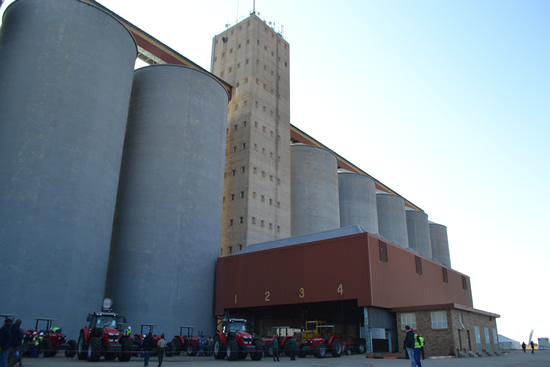 Previously the government had announced that it would invest R2 billion into supporting rural economies and creating industries in these areas.
Previously the government had announced that it would invest R2 billion into supporting rural economies and creating industries in these areas.
Agri-parks have been identified as the vehicle that will kick-start rural economic transformation and encourage growth of the smallholder farming sector – an area that has seen slow growth due to a lack of resources, including markets for the sale of produce, livestock, skills and infrastructure.
The creation of agri-parks will breathe new life into South Africa’s rural areas, revitalise small towns, increase employment and contribute to food security.
Once operational, agri-parks will create close to 90 000 in value addition activities linked to various Agri-Park components. This excludes the contribution that will be made towards the establishment of 300 000 smallholder farmers.
“I must say that since we started this programme, there have been a lot of encouraging developments.
“The Banking Association of South Africa came forward and said it is getting involved and will invest R1 billion into land reform, every year, over the next 15 years. “It is encouraging. We are working with them to develop a model for agri-parks,” he said. (See Errata below)
The Minister said the involvement of the banking sector will further give credibility to the agri-parks project as government aims to ensure that poor people work closer to home, instead of migrating to bigger cities in search of economic opportunities.
He is convinced, that over the next 10 years, the country will have a different rural community, one which will have some enterprises and industries.
“It also provides us with the opportunity to invest in the underdeveloped side of the economy.
“We want to spend more money there. Starting this year, we are putting R2 billion in all 44 districts so that we can transform the economy in those areas because they provide us with the opportunity we need to create jobs.
“You are never going to stop migration if you don’t invest in rural areas. We need to do something where people live so that we can create a balance between the developed and underdeveloped areas.”
He said BASA’s involvement also added an additional security feature to the entire project.
Progess made in rolling out Agri-parks
The Minister said that a lot of progress has been made in rolling out agri-parks around the country.
The idea behind agri-parks is to focus on agro-processing to create jobs and boost exports. Some of the planned agri-parks are linked with the Department of Trade and Industry’s Special Economic Zones.
“One agri-park is ready to be launched in the North West. Production plans have been developed and are being implemented across the country to ensure increased production in the areas supporting the agri-parks.
“The Department of Science and Technology is busy with a feasibility study on agro-innovation hubs that will support the development and dissemination of appropriate technologies to be implemented in agri-parks,” he said.
He said that 12 221 smallholder producers were supported through advisory services, training, technical support and infrastructure from April to June 2015.
Minister Nkwinti said that 36 additional farms are being supported under the Recapitalisation and Development Programme.
The Recommissioning Strategy for the Western Cape forestry exit areas has been approved to put about 22 000 hectares of state forestry land back into commercial forestry operations.
“The resultant benefits range from job creation, local economic development and future improvement in timber supply.
“According to a study that was commissioned by the Department of Agriculture, Forestry and Fisheries and the Independent Development Corporation, the recommissioning of Western Cape plantations will employ 350 full-time workers for the five-year period.
“This number will increase to 1500 when the plantations are in full production.”
*Linda Page works in the Ministry of Rural Development and Land Reform
ERRATA
We erroneously reported that the Bank Association of South Africa (BASA) would invest R1 billion in agri-parks annually to revive the rural economy.
BASA has in fact made an in-principle commitment of R1 billion per annum for the next 15 years to support the land reform program of the department NOT the agri-parks initiative.
It should however be noted that government has allocated an amount of R2 billion for the agri-parks program for the current financial year, this is not to be confused with the in-principle commitment
by BASA as indicated above.
Impendle farming cooperatives get a boost
Impendle farming cooperatives get a boost lebangThe lives of residents of Ezinga (Impendle), outside Pietermaritzburg, will be changed for the better following the launch of four communal estates in the area.
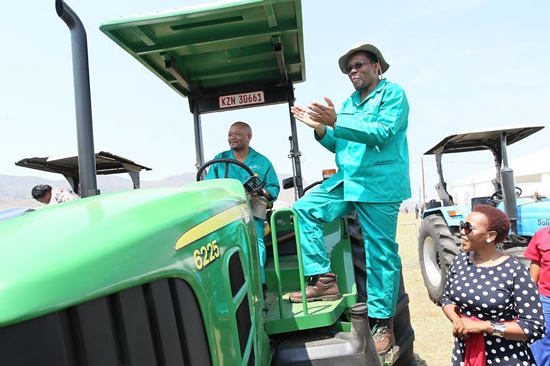 The estates aim to encourage the community to participate in the agricultural economy.
The estates aim to encourage the community to participate in the agricultural economy.
The investment came after the KwaZulu-Natal (KZN) Provincial Government relooked at the way in which it structured its programmes to focus on creating food security and turning agriculture into a science and a business.
The launch forms part of government’s Comprehensive Rural Development Programme (CRDP) that aims to tackle issues such as underdevelopment, food security, unemployment, poverty and other social ills, which have become synonymous with rural areas.
A total of R15 263 660 will be invested in Impendle with each cooperative receiving three tractors, a cheque for approximately R400 000 for a tractor and driver running costs, and farmer and extension service support.
KZN Premier Senzo Mchunu and MEC for KZN Agriculture and Rural Development Cyril Xaba visited the four cooperatives that are beneficiaries of the initiative - Impendle Cropping, Sthujwana Project, Indabuko Project and Ntshiyabantu Project. They also visited other farming sites.
An upbeat Premier Mchunu said that the programme is only one pillar in the KZN Department of Agriculture and Rural Development’s strategy.
“There is still more to be done in the province regarding all forms of agriculture. I urge the people of the province to take part in the sector as it offers great opportunities,” he said.
MEC Xaba said the launch of the programme was only the beginning and that the department was making strides to change the face of agriculture in the province.
“The department has monitoring mechanisms in place to oversee the day-to-day running of these cooperatives. It really wants to ensure that these two economies merge. We are on a campaign to turn the province green and ensure all farmers participate in the province’s and country’s economy,” said MEC Xaba.
Phindile Mncube, of Indabuko Cooperative Project, said the provision of tractors would help them increase their project’s food production.
“We used to hire tractors which were costly. This made us plant on a small portion of land, but this will be thing of the past as we have our own tractors,” she said.
Mayor Sizwe Ndlela said the Impendle local municipality was very privileged to be visited by provincial government for such development.
“The people of Impendle solely depend on the agricultural economy to provide for their families. As a result the municipality has provided a big machine to grind maize meal to make mealie meal,” he said.
Bursaries for social work students
Bursaries for social work students lebangIt is comforting to know that young people like Mbali Mapela (23), who are committed to caring for the vulnerable in our society, exist.
 Mapela from Soweto, Johannesburg, is a social worker employed by the Gauteng Department of Social Development.
Mapela from Soweto, Johannesburg, is a social worker employed by the Gauteng Department of Social Development.
She said becoming a social worker was a calling rather than just a career.
“I always knew that I wanted to study social work. I chose this career because I wanted to be the change in my community by being involved and providing assistance to vulnerable people in our society.”
Mapela works directly with young people who have broken the law and comes up with interventions to help them change their lives.
“I get a request from the court to look into the case of a child who has committed a crime. I look at their family situation and find ways to intervene for the betterment of the child. I compile a report for the court on the situation the child is facing.”
Mapela has also faced some adversity in her life. After completing matric at Letsibog Girls High School in Pimville, Soweto, in 2009 she struggled to continue with tertiary education because her mother was unemployed.
“One day I came across an advert in the newspaper in which the Gauteng Department of Social Development was advertising scholarships to study social work. I obtained university entrance at matric level and I decided to apply for the bursary.”
The criteria for interested students includes:
- Young people who are unemployed.
- Young people who received university acceptance.
- First preference in terms of receiving the bursary is given to foster children, orphans, child-headed families, disabled youth and young people with financial difficulties
She was selected for the scholarship, studied towards a degree in social work at the University of Johannesburg from 2011 and graduated last year.
After completing her degree she was absorbed into the department to work as a social worker.
“I am very grateful to have received this scholarship from government. Working for the department is a way of saying thank you because I would not have been able to further my studies without them.”
Addressing the social worker shortage
The Gauteng Department of Social Development is slowly closing the gap in the social worker shortage.
Between 2007 and 2014 more than 600 young people graduated as qualified social workers after receiving the social work scholarship.
In the 2015/16 financial year the department provided 80 scholarships to young people in the field of social work.
According to the National Department of Social Development the ratio for social workers to the population countrywide is estimated at 1:5000.
The roll out of the scholarship was one of the ways the government was trying to meet the target of 55 000 social service practitioners set out by the National Development Plan.
Since the scholarship programme started about 8 000 young people have graduated with the department’s assistance, across the country. More than 3500 of these graduates have been absorbed into the public service.
The Gauteng Department of Social Development advertises bursaries for different fields of study and the social work scholarship.
The Gauteng Department of Social Development said that the next intake of students interested in applying for the social work scholarship will be in September 2016.
Young people can go onto the Department of Social Development’s website on www.dsd.gov.za or www.gautengonline.gov.za to find out about opportunities.
Contact 011 355 7600 for assistance in Gauteng. For other provinces call 012 312 7294 or 012 312 7223.
Those wishing to apply can get in touch with their Provincial Department of Social Development for further assistance, as the National Department of Social Development does not take accept applications.
Hope, help for abused women
Hope, help for abused women lebang*Ntombi Mdunge, 23, was forced into prostitution after becoming a victim of human trafficking.
 With no formal education and no prospect of a job, Mdunge answered a job advertisement for female waitresses needed for a new restaurant in the Free State. According to the advertisement, waitresses would be paid R14 000 a week.
With no formal education and no prospect of a job, Mdunge answered a job advertisement for female waitresses needed for a new restaurant in the Free State. According to the advertisement, waitresses would be paid R14 000 a week.
Mdunge, who is from Pretoria, saw this as an opportunity to escape poverty and support her family. She responded to the advert and boarded a bus to the Free State. However, she was not prepared for what was waiting for her when she arrived.
“When I arrived in Welkom to start my new waitressing job, I was sent to a house in a secluded area. I was greeted by a lady who took my identity document and offered me alcohol.
“This lady explained to me the job that I was going to do needed me to have alcohol in my system. This was when I started to be suspicious but it was already too late because all the doors and the gates of the premises had been locked and there was no chance for me to escape.”
Mdunge was a victim of human trafficking and was forced into a life of prostitution for three months.
Human trafficking is when people are removed from their homes under false pretenses or by force and taken to another place or other places – inside the country or outside the country – in order for them to be exploited.
Caring for abusedwomen and children
Mdunge eventually managed to escape and was referred to a shelter for abused women and children in Pretoria.
The shelter, which is run by the Sisters of Mercy from the Roman Catholic Church, is a public-private partnership between the church and the Department of Social Development (DSD).
The shelter receives a subsidy from the DSD.
Mary Mmushi, a social worker at the centre, said the organisation ensures that women and their children feel protected.
“People come here for safety and for comfort because they come from situations where there is really nothing for them.
“When they come here, their basic needs are met and they are given assistance with finding a job,” said Mmushi.
She said the number of the women that stay at the shelter varies from month to month. In October, between 28 and 30 women received help.
“Some stay for a day or two and others stay longer, depending on their situation.”
Women empowerment progammes
Mmushi adds that when a person arrives at the centre, she interviews them to ensure that they meet the criteria before they are assisted.
“The criteria is that they need to be 18 years and above and be a victim of human trafficking or domestic violence.”
In addition to providing immediate assistance, the centre runs a nine-week restoration and healing programme designed by the DSD for victims of human trafficking and domestic violence.
Mmushi says a lot of non-profit organisations and government departments know about the centre.
“We get our referrals from the police on cases of domestic violence and victims of human trafficking. The DSD also does referral along with churches, schools, embassies and courts.”
16 Days of Activism for No Violence Against Women and Children
The 16 Days of Activism for No Violence Against Women and Children campaign is an international awareness-raising campaign.
It is commemorated every year from 25 November (International Day for the Elimination of Violence Against Women) until 10 December (International Human Rights Day). The period also includes Universal Children’s Day and World Aids Day.
Mmushi said such campaigns do assist in raising awareness that abuse is wrong.
“It’s important that society changes and knows that the abuse of women in any form is wrong. We must start from grade one to teach children how to treat each other; girls must have confidence in their worth and boys must know how to treat women.”
*Ntombi Mdunge is not her real name.
Human trafficking can be reported at police stations or contact the human trafficking hotline on 0800 737 283 or 0800 555 999.
Know your Minister
Know your Minister lebangOver the next few months Vuk’uzenzele will bring you short profiles of Ministers in our Cabinet. This is a chance for you to know your leaders and learn more about what they do.
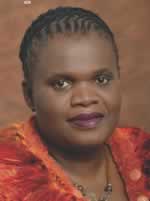 Minister Faith Muthambi
Minister Faith Muthambi
Minister Faith Mutha-mbi is the Minister of Communications. The Department of Communications is a new department that came into being after
government reconfigured departments in line with the new mandate.
About the department
The department has various agencies reporting to it. Agencies like Independent Communications Authority of South Africa (ICASA), South African Broadcasting Corporation (SABC), , Government Communications (GCIS), Brand SA; Media Development Diversity Agency, and the Film and Publication Board.
The department is responsible for providing communication services and creating an environment for the provision of inclusive communication services to all South Africans in a manner that promotes socio-economic development and investment through broadcasting, new media, print media and other new technologies, and brand the country locally and internationally.
Abouth the minister
Minister Muthambi holds a BProc degree from the University of Venda in 1996 and completed her Attorney's Admission Exam in 2000. She is an admitted attorney of the High Court of South Africa, a member of the Black Lawyers Association and of the South African Women Lawyers Association.
Her other string of qualifications include a Certificate in Computer Training; Certificate in Executive Leadership in Municipality Development Programme; Certificate in Project Management; Certificate in Fraud Examination; Programme in Municipal Finance Development; Certificate in Sports Law and Certificate in Leadership Development.
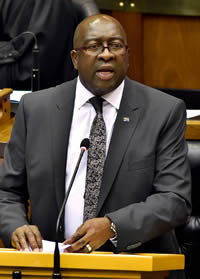 Minister Nhlanhla Nene
Minister Nhlanhla Nene
Minister Nene has been Minister of Finance since 26 May 2014. His department is called National Treasury. Mr Nene was Deputy Minister of Finance of the Republic of South Africa from 5 November 2008 and was re-appointed to the position from 11 May 2009 to 25 May 2014.
About the department
The National Treasury is responsible for managing South Africa’s national government finances. The department is mandated by the Constitution to ensure that there is transparency, accountability and sound financial controls in the management of public finances.
About Minister Nene
Minister Nene brings a lot of experience to the ministry of finance after serving Parliament as an MP from June 1999.
He holds a B.Com Honours degree in Economics from the University Of Western Cape (UWC), a Diploma in Marketing Management, an Advanced Diploma in Economic Policy from the UWC, a Certificate in Economic Policy from University of South Africa and a Certificate in Macro and Micro Economics from the University of London.
In 2000, Mr Nene attended a course in Evaluating Macroeconomic Strategies at Williams College (CDE), MA, USA. He matriculated at Gcothoyi Adult Centre.
Grant to produce artisans
Grant to produce artisans lebangThe Department of Basic Education’s (DBE) technical secondary schools recapitalisation conditional grant is starting to bare fruit.
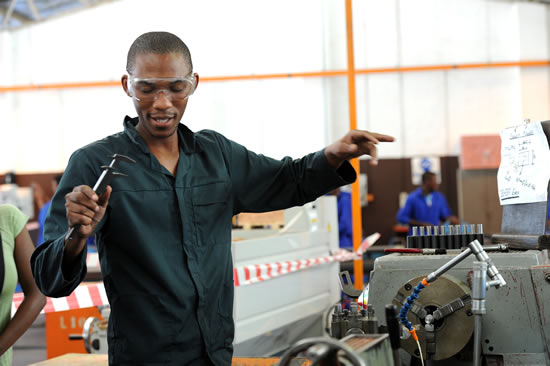 The grant aims to encourage high school learners to be artisans by providing infrastructure, such as workshops, to technical schools around the country.
The grant aims to encourage high school learners to be artisans by providing infrastructure, such as workshops, to technical schools around the country.
Elliotdale Technical and Commercial Senior Secondary is a recent recipient of the programme. The school received four state-of-the-art workshops for mechanical, electrical, civil technology and engineering graphics and design.
Lungile Ndayi the school’s principal said teaching and learning has improved since the workshops were built.
He added that learners are more enthusiastic to learn the theory and the practical application of their studies.
“In the past we would conduct the theory and the practical in one classroom. There was not enough space, which meant that students would be squashed in one room.”
“The students now have a fully-fledged workshop where they can conduct their practical learning.”
Ndayi added that there is a high demand for technical skills in the area.
“The school is already full in terms of taking in new students for the 2016 academic year.”
It currently has 805 learners from Grade 10 to 12.
Pupils have to do six subjects at the school including mathematics, languages, sciences and commercial subjects.
“They have to choose one technical subject until they reach matric.”
He added that his school had produced six qualified civil engineers who developed an interest in the built environment while they were at the school.
“We are aware that the country needs artisans and civil engineers. As educators we are doing our best to encourage students to this sector.”
Ndayi added that as a way of developing artisans his school was working with uMthatha Technical College to have evening classes at the school, even beyond matric level.
“Most of the learners that come to this schools are from poor rural areas. Once a learner has completed matric the chance of continuing with their studies is very small.
“Learners would be interested in evening classes for artisans at the school as they would not have to travel to the city for education.”
Enoch Mchiza, project coordinator for the technical secondary schools recapitalisation grant at the DBE, emphasised the importance of technical education.
“Learners also receive assistance in mastering technical skills and they are equipped with entrepreneurial skills.”
He added that technical education enhanced engineering principles for learners who would like to enrol in the engineering fields.
A total of 112 new workshops were built and 447 workshops were refurbished; 538 workshops received new equipment, tools and machinery and 3194 teachers were trained in different parts of the country, as part of the grant.
The department also revised the curriculum for technical schools to introduce areas of specialisation in mechanical, electrical and civil technology.
This included the introduction of technical maths and science, to strengthen the technical education pathway.
Through the Technical Secondary Schools Recapital-isation Conditional Grant:
- 3 194 teachers were trained across the country.
- 538 workshops received new equipment.
- 447 workshops were refurbished.
- 112 workshops were built.
Year of the artisan campaign showing results
Since 2012 the Department of Higher Education and Training (DHET) has helda nation-wide campaign, the Decade of the Artisan, to encourage young people to join the sector.
More than 28 000 young people registered to be artisans during the 2014/15 financial year, with more than 14 000 learners completing artisan-related learning programmes.
The Decade of the Artisan campaign seeks to promote artisanry as a career of choice to the youth within the post-school education and training system and highlight skills development opportunities.
According to the DHET more than 28 000 young people registered to be artisans during the 2014/15 financial year, with more than 14 000 learners completing artisan-related learning programmes.
Gauteng had the highest number of learners registering with 9158, followed by KwaZulu-Natal with 2851.
Accoring to DHET the average age of artisans is 55 and the population is ageing.
For more information about becoming an artisan call 011 206 1000 or the National Artisan Development Support Centre on 011 736 4400. Visit the website www.nadsc.dhet.gov.za
Upskilling inmates
Upskilling inmates nthabiThe Department of Correctional Services (DCS) is working hard to ensure that it builds a community of responsible offenders who can contribute to the economy of the country while advocating for safe, and peaceful, communities. The department’s skills development programmes and opportunities, aim to provide offenders with a second chance to correct their offending behaviour.
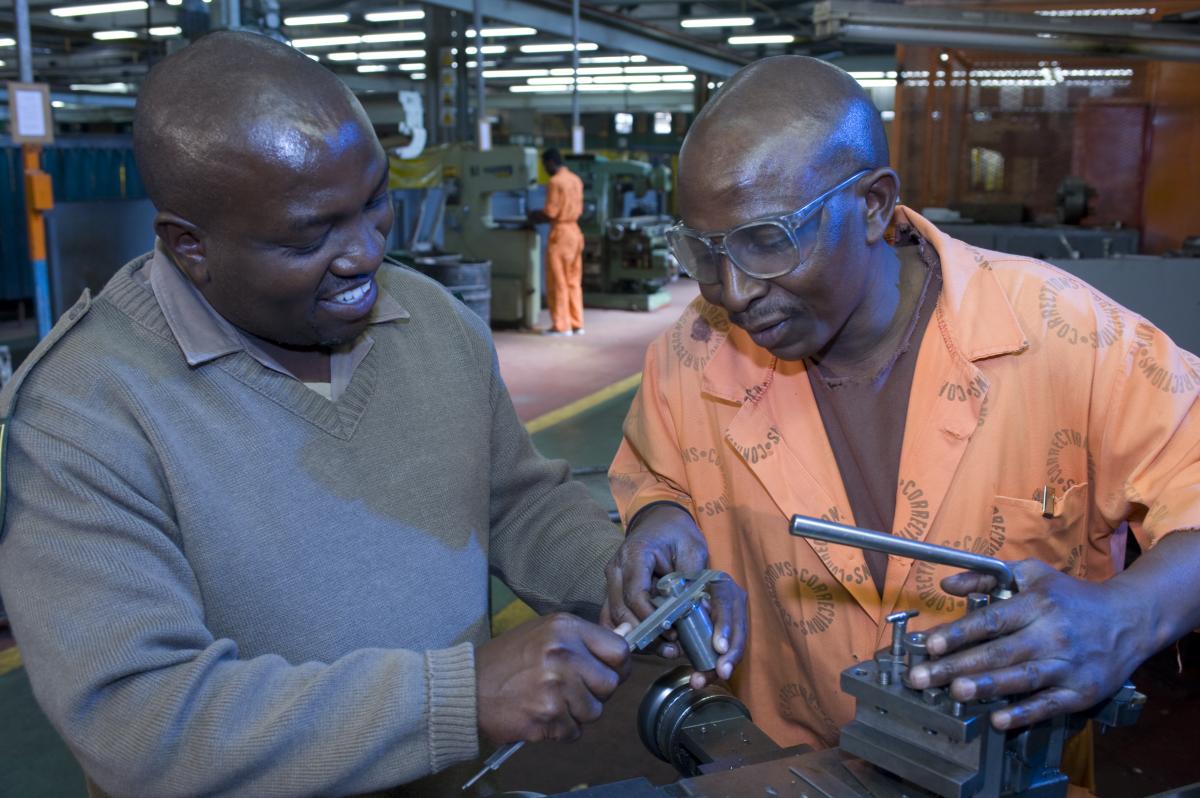 National Commissioner of the DCS Zack Modise said through skills development programmes his department wanted to build a community of responsible offenders who can contribute positively to their communities.
National Commissioner of the DCS Zack Modise said through skills development programmes his department wanted to build a community of responsible offenders who can contribute positively to their communities.
“We want to ensure that, upon release, every offender carries a sense of worth and a skill that will ensure self-sustainability, taking into account socio-economic and cultural backgrounds.”
At the end of the 2014/15 financial year, DCS had provided vocational training for 1 728 offenders in the agriculture, construction, food and beverage, computer, electrical, motor mechanics, textile production, welding and woodwork sectors.
All the courses that inmates attended have a module on entrepreneurship and they are encouraged to be self-employed once they are released.
The training is funded by the Department of Higher Education and Training (DHET).
This was a result of a five-year agreement, dating back to 2011, in which more than R66 million was given to DCS to train over 5 000 offenders.
The DCS was hoping to stretch this budget by training more than 7 000 inmates at the end of the five-year period.
As of May 2015 about 4 032 female offenders were incarcerated in different correctional centres across the country.
Carmen Smith is (45), who was convicted of fraud, is one of the inmates receiving skills development training from the Department of Correctional Services (DCS). Smith plans to start a catering company when she is released from Pollsmoor Correctional Centre in Cape Town.
“My life was spiralling out of control when I defrauded my customers. It was in here [Pollsmor Correctional Centre] that I came to my senses.
Inmates are receiving training in agriculture, construction, food and beverage, computer and electrical to name a few.
“Now I will have to start all over, but what I will do differently this time is empower other women,” she said. Smith is one of the 76 female inmates who received training in building, construction and plastering, assistant chef training and beadwork.
She completed the assistant chef course, which earned her 53 credits towards an assistant chef certificate.
In order for Smith to take part in the training programme she needed to have a valid South African identity document and have completed Grade 9 or the Adult Education and Training (AET) level 4.
Ruth Mbana (38) also an offender at Pollsmoor Correctional Centre decided to enrol for the building course even though she is a qualified carpenter.
"Government is sympathetic towards women who want to make it in the building trade and being in a correctional centre is not the end for me," she says.
*Estelle Coetzee works for the Department of Correctional Services.
Understanding the bail process
Understanding the bail process nthabiMany South Africans are often confused about what bail means and how it features in the criminal justice system.
 There are often questions about who qualifies for bail and what happens to the money paid during this process. Here’s some information to help you better understand bail.
There are often questions about who qualifies for bail and what happens to the money paid during this process. Here’s some information to help you better understand bail.
What is bail?
Bail is money paid to the court or to the police. By paying bail an accused can go home until the date of their court case. Once the case has been heard, bail money is paid back to the accused even if they are found guilty. Bail money will not be paid back if the accused fails to appear in court, if there is witness interference or if bail conditions are broken.
What is the purpose of bail?
The purpose of bail is to afford those who qualify the chance to be freed from jail until their trial. Bail also ensures that a person comes back to court for trial.
When can the accused person apply for bail?
The accused person can apply for bail at any stage of the court proceedings when they are before the court. Normally the accused is brought before a court within 48 hours of arrest and this is when a person can then apply to be released on warning or bail if the case is not finalised on that day.
What is the effect of bail granted?
By paying bail the accused promises to come to court for future hearings of the case and agrees that if they do not return, the money paid as bail may be forfeited to the state. In turn, the accused is then released until the next date that the case is again heard before court, until the case is finalised.
When applying for bail, what must the accused comply with?
When applying for bail the accused must convince the judge or magistrate that they will not run away, not be a danger to others, will not any commit further crime, and will not intimidate any witness in the case.
If an accused is released on bail they will receive a written notice. This notice will inform the accused of the pending court appearance and indicate the day and the time that they are required to appear in court. The written notice will also outline any conditions, if any, such as the accused must report to the police station every week.
What is required during a bail hearing?
The prosecution will prove that the accused is linked to the criminal offence that the person is charged with. The defense will present factors, which will assist the accused to get bail.
How long will a bail hearing take?
This depends on whether the parties, being the defense and the prosecution, wish to call witnesses. The number of witnesses they intend calling usually increases the time spent during a bail hearing.
Is the granting of bail a reflection of the case?
No. Granting of bail must not be seen to be a reflection of the state’s case against the accused. Neither does bail granted imply acquittal or withdrawal of the case. Even when bail is granted,the accused will still face the charges in a court of law when a trial date is set.
Do you get a receipt when paying bail?
On paying bail, one must be issued with a receipt. Only a person with a receipt for the bail will be reimbursed once the trial is complete.
Is the bail money refundable?
When the court case is over, the bail money is paid back even if the accused is found guilty.
Bail money will however not be paid back, if the accused does not come to court on the day of their court case, or if they break any of their bail conditions such as if they interfere with any witnesses.
If an accused does not appear at court the bail will be forfeited to the state unless convincing reasons can be provided as to why the person could not be at the court when they were supposed to.
Can communities take legal action against an accused?
In cases, where applicable, members of the community can bring information to the attention of the investigating officer that would assist the prosecution in opposing any bail application by an accused person.
Where bail has been granted with conditions, community members can bring to the attention of the investigating officer any breach of such conditions in order for the prosecutor to apply for the revocation of bail.
*Samona Naidu works for the Department of Department of Justice and Constitutional Development.
For more information on the bail process you can contact the National Prosecuting Authority of South Africa on 012 845 6000 or visit www.npa.gov.za
SA chairs Open Government Partnership
SA chairs Open Government Partnership nthabiInternational relations
South Africa has committed to using its chairpersonship of the Open Government Partnership (OGP) to develop and implement ambitious open government reforms.
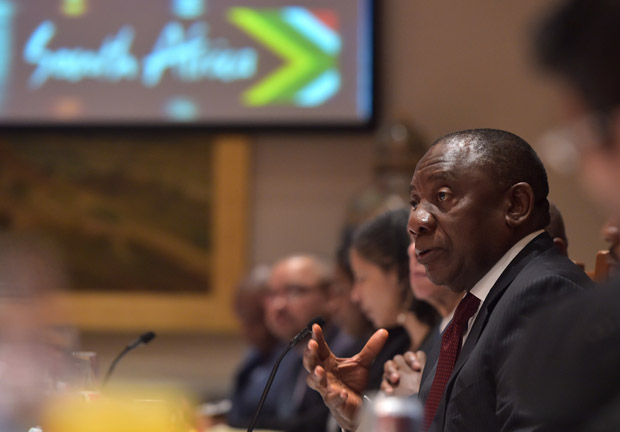 South Africa and France assumed the OGP chair in Mexico recently.
South Africa and France assumed the OGP chair in Mexico recently.
OGP was launched in 2011 to provide an international platform for domestic reformers committed to making their governments more open, accountable and responsive to citizens. Since then, OGP has grown from eight countries to 66.
Speaking at the OGP summit in Palacio de Bellas Artes, Mexico, Deputy President Cyril Ramaphosa said during SA’s tenure, South Africa will ensure that the OGP and its principles of open government remain a cornerstone of global efforts towards a sustainable future for humanity.
“It is important that the OGP consistently lead by example. It must be the embodiment of the values and principles we wish others to emulate,” he said.
The Deputy President said there are many lessons South Africa will share from the African continent to strengthen internal mechanisms to ensure greater transparency and inclusive participation.
During its tenure, Deputy President Ramaphosa said South Africa intends to lead efforts and a conversation between governments to renew the vigour and political commitment that characterised the founding years of the OGP by proposing, among others, a standard annual parallel gathering of the Heads of State and Government on the side-lines of the United Nations General Assembly.
South Africa also intends to ensure the optimal functioning of the Independent Review Mechanism by promoting initiatives that will ensure that National Action Plans reflect the commitments made in the OGP Declaration and promote goal 16 of the UN 2030 Agenda on Sustainable Development.
Further, it aims to create more space for South-South cooperation and sharing of lessons, resources and experiences in implementing the OGP.
This, Deputy President Ramaphosa said, will be done by engaging and promoting closer engagement with the G77 countries but will not be done at the detriment of North–South cooperation and collaboration.
Another target was to ensure that the OGP remains true to its cardinal principles of voluntarism, and that it does not become a tool of punishment but rather a platform for mutual learning and experience sharing in developing interventions that put people at the centre of development.
South Africa also intends to create platforms for experience sharing and best practice learning from other similar experiences and mechanisms such as the African Peer Review Mechanism (APRM).
Deputy President Ramaphosa believed that the OGP can learn from how the APRM operates.
The APRM is a self-monitoring instrument created by African leaders in 2003 as one of the ways African leaders respond to calls for good governance in an innovative approach designed and implemented by Africans for Africa.
Deputy President Ramaphosa told the summit that the through the APRM, the African continent contributed significantly to the formulation of the goals and targets of the UN 2030 Agenda on Sustainable Development.
Business opportunities for SA, Mozambique
Business opportunities for SA, Mozambique nthabiInternational relations
South African businesses and investors have been urged to make the most of the opportunities available in Mozambique, especially in light of the newly discovered gas reserves in the neighbouring country.
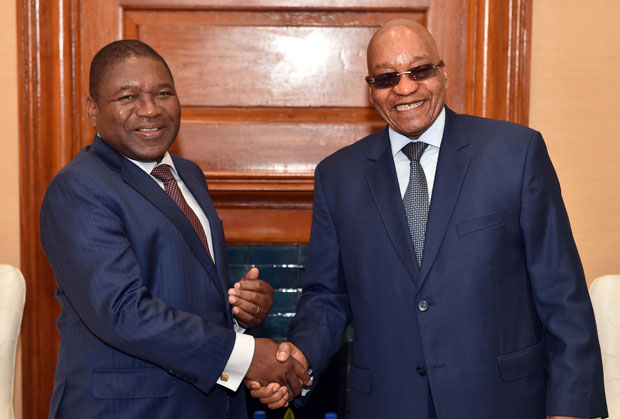 The South Africa-Mozambique Business Forum met recently where commitments were made to up cooperation across various fields. The forum was attended by the two countries’ Heads of State and key figures in the business arena.
The South Africa-Mozambique Business Forum met recently where commitments were made to up cooperation across various fields. The forum was attended by the two countries’ Heads of State and key figures in the business arena.
The delegations identified tourism, transport, communications, science and technology as some of the strategic areas of cooperation. However, collaboration in unearthing business potential in energy and mineral resources took centre stage.
“South Africa and Mozambique boast a long standing cooperation in the field of energy.
“The energy cooperation between the two countries is characterised by sharing of energy and power resources, focusing on power plants and related infrastructure undertaken by Eskom and EDM [Electricidade de Moçambique], as well as the natural gas business to advance the development of gas to power projects.
“Mozambique offers great possibilities considering the newly discovered gas reserves. Our Ministers will ensure the implementation of our agreements in the energy sectors, particularly in oil and gas sectors.
“There are opportunities for South African companies to enter the Mozambique hydrocarbons sector in ways beneficial to both countries,” said President Jacob Zuma.
The Mozambican energy sector received an estimated $3.238 billion investment for just five projects investment in 2014. CPI data shows that the sector accounted for 45.6 per cent of total investments approved by the Mozambique Investment Promotion Centre. Investments are said to have reached $7.102 billion for 487 projects.
The International Monetary Fund (IMF) estimates that coal and natural gas production could potentially increase Mozambique's economic growth rate by two percentage points annually from 2013 to 2023. The IMF also estimates that Mozambique grew by seven per cent in 2013. Mozambican President Filipe Jacinto Nyusi said he was happy to partner with South Africa.
“South Africa is our neighbour and we are looking forward to doing business together,” he said.
In 2014, total trade between South Africa and Mozambique was recorded just below R44 billion, increasing from R29 billion in 2012. South Africa has emerged as the main trading partner for Mozambique and its main source of foreign direct investments.
Over 300 South African companies have invested in Mozambique and it is now part of the top five of South Africa's trade partners in the region.
President Zuma said the scope to further growth remains, hence the business forum was convened.
SA, Denmark sign water pact
SA, Denmark sign water pact Estelle GreeffInternational relations
Water and Sanitation Minister Nomvula Mokonyane has signed a Memorandum of Understanding (MoU) with the Danish Ministry of Environment and Food.
 The MoU, signed in Johannesburg recently, is set to strengthen cooperation in the water sector, especially with the Danish private sector partnering with local businesses.
The MoU, signed in Johannesburg recently, is set to strengthen cooperation in the water sector, especially with the Danish private sector partnering with local businesses.
The Danish are global leaders in water efficiency and waste water management. The signed memorandum will present the South African water sector with an opportunity to learn from the best.
Through the agreement, the sector will learn about innovative technological solutions, land and water management systems and skills development.
Other areas to be explored include support to local government in terms of management, investment opportunities, raising human capital, skills and knowledge transfer.
Minister Mokonyane said she was delighted at the breakthrough it meant development for not only the country’s water sector but for the country as a whole.
She said there was great potential for South African-Danish partnerships in the water sector, which would help alleviate the current challenges faced by the country.
“Communities will be uplifted and jobs will be created, and both countries will greatly benefit,” she said.
2015 Sport Awards nominees announced
2015 Sport Awards nominees announced nthabiSport, arts and culture, youth
The Department of Sport and Recreation will host the SA Sports Awards for the 10th year later this month.
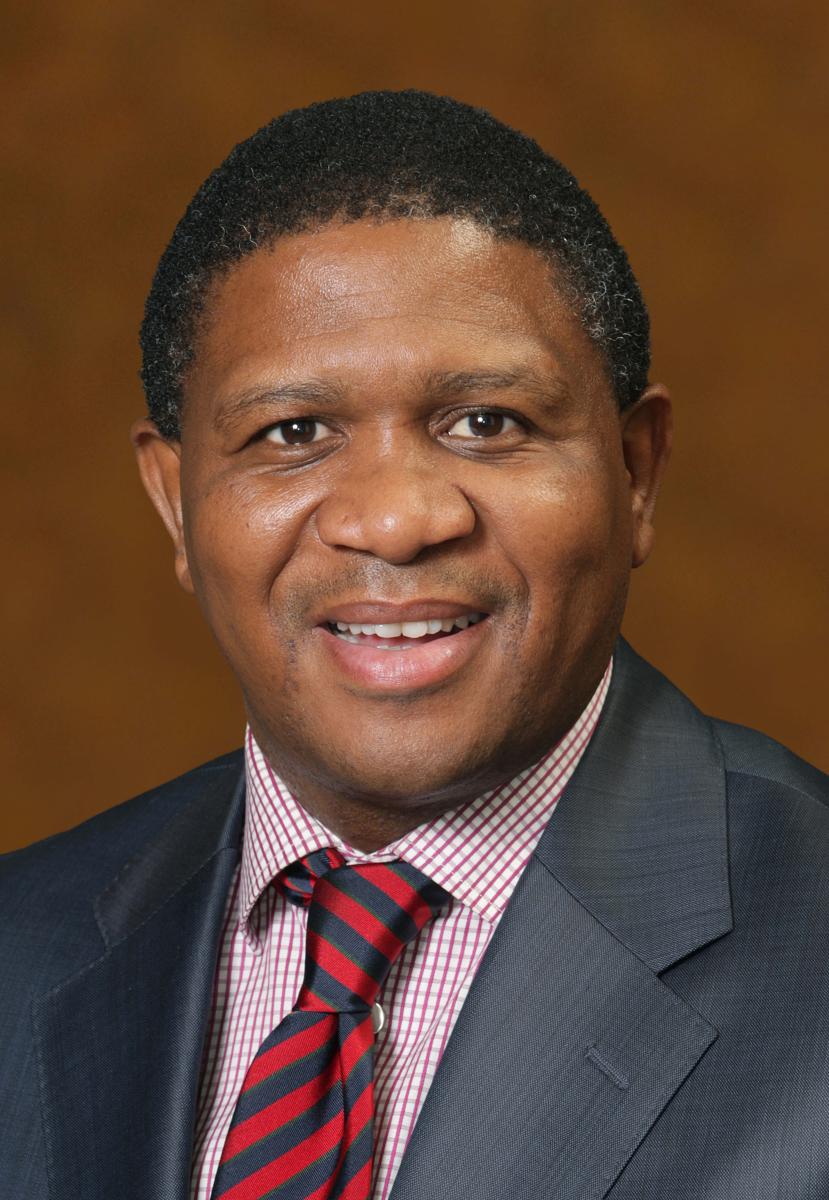 “This is a significant milestone and we’re celebrating the best sporting moments of the past 10 years, best moments of the Sport Awards and the best sport people that this country has produced,” said Minister Fikile Mbalula.
“This is a significant milestone and we’re celebrating the best sporting moments of the past 10 years, best moments of the Sport Awards and the best sport people that this country has produced,” said Minister Fikile Mbalula.
The minister also announced the nominees for this year’s awards.
“Every year the SA Sport Awards adopts a creative theme which is used to rally support and excitement. We’ve gone with #IZINJAZEGAME… The Best for 2015. The majority of South Africans can identify with this colloquial phrase which, loosely translated, means that you are the top dog, the best at what you do,” said the Minister.
The theme for this year’s awards are under the theme “Excellence is not being your best; it is doing your best”.
The awards will be broadcast live on
SABC 1 on 22 November 2015.
Nominees in Sportsman of the Year
- Greg Minaar
- Chad Le Clos
- Wayde van Niekerk
Nominees in the Sportswoman of the Year
- Ashleigh Moolman-Pasio
- Shabnim Ismail
- Bridgitte Hartley
Nominees in the Sportsman of the Year with Disability
- Lucas Sithole
- Ernst van Dyk
- Pieter du Preez
The nominees for the Sportswoman of the Year with a Disability
- Kgothatso Montjane
- Ilse Hayes
- Peggy De Villiers
Among other nominees include those in the Newcomer of the Year category namely: Nokwanda Hlongwane, Jayde Andrew Julius and Kagiso Rabada while the Coach of the Year nominees are Holger Losch, Geoffrey Toyana, Roger Barrow and Graham Hill. Meanwhile the Federation of the Year nominees are Roller Sport, Cycling and Basketball.
This year’s awards will bring pleasant changes to the most contested category - the Sports Star of the Year. The category will now be nominated and voted for by a panel of sport editors from different media houses.
Each media house will nominate two sport stars and motivate their recommendation, the panel will then vote for the ultimate winner.
The public still gets an opportunity to vote for their favourite sport star by SMS. This category is the People’s Choice Award. The nominees for the 2015 People’s Choice Award are AB De Villiers; Ashleigh Moolman-Pasio; Chad le Clos; Lucas Sithole and Wayde van Niekerk.
The awards ceremony will be held at the Sand du Plessis Theatre in Mangaung, Free State.
“The Sport Awards celebrate excellence throughout the country and taking the event to the people is a critical part of our mandate. We are excited and promise the people ofMangaung a celebration,” explained the Minister.
A fan park at the Seisa Ramabodu Stadium will ensure that the public participate in the festivities of the awards.
Each category nominee receives R15 000 cash and the winner in each category receives R130 000.
The winner for the Sport Star of the Year receives a luxury vehicle, R500 000 for themselves and R500 000 to donate to a charity of their choice. The People’s Choice Award winner also receives a luxury vehicle, R500 000 for themselves and R500 000 to donate to a charity of their choice.
The South African Broadcasting Corporation (SABC) will be the official broadcaster of the SA Sport Awards.
Group chief executive officer Frans Matlala said: “We are proud that as a public service broadcaster, we will be able to take our viewers and listeners on a journey towards these prestigious awards, which aim to recognise and reward our sporting champions and icons.
Minister Mbalula said the country’s sporting heroes continue to make the nation proud.
“The Sport Awards gives us all an opportunity to pay tribute to those who excel both on and off the field. We’re always inspired by our athletes as they continue to push boundaries and reach new heights of excellence,” said Minister Mbalula.
Nation of Champions project targets youth
Nation of Champions project targets youth nthabiSport, arts and culture, youth
In September the Commonwealth Games Federation announced it had chosen the City of Durban to host the 2022 Commonwealth Games.
 Twenty days later it was announced that a youth-oriented Commonwealth Games legacy project called Nation of Champions had been started.
Twenty days later it was announced that a youth-oriented Commonwealth Games legacy project called Nation of Champions had been started.
Entrepreneur and founder and chair of OPENTENDERS Madoda Khuzwayo and Nik Eberl, creator of a Peer-to-Peer Mentoring System, designed the Nation of Champions project.
The aim is for the 2022 Games to leave a lasting, positive and meaningful legacy especially for the youth of South Africa.
Nation of Champions is a “hybrid social networking movement” that will give young people free access to all kinds of courses, skills, mentorship, networking and opportunities to offer services to providers involved in the Games.
These range from driver training to transporting the expected influx of tourists, to acting as entertainers and in areas ranging from construction to hospitality and catering and everything in between.
“The concept of Nation of Champions is pure genius in its simplicity and formidable in its ambition," said David Grevemberg, Chief Executive of the Commonwealth Games Federation.
It is an important way to access willing, eager entrepreneurs and small businesses.
Explaining the purpose of the Nation of Champions Khuzwayo said the Nation of Champions enables entrepreneurs to meet others who think the same way: they sign up free of charge and find other young people to connect with, network with and sell to, said Khuzwayo.
The Nation of Champions takes the form, primarily, of a fully-fledged online university aimed at building young entrepreneurs and enabling them to take business forward, said Khuzwayo.
The website has an online tender and procurement social networking forum that offers assistance and various resources to aid young entrepreneurs.
Gideon Sam, chairman of Nation of Champions, said it was hoped thousands will have benefited from the Games and be left with a real legacy.
Of South Africa’s population 60 per cent is under the age of 30. The NDP’s target is 11 million jobs by 2030.
Of these, 90 per cent of jobs will have to be created by small businesses said Khuzwayo. Growing entrepreneurship therefore is essential to growing South Africa’s economy, yet Khuzwayo questioned whether the youth knew that they had to create those 11 million jobs and carry the economy forward.
MEC Maile pointed out that this was where the Tshepo 500 000 employment creation and entrepreneurship development initiative (www.tshepo500000.co.za) could help.
It is devised to help young people with various skills including entrepreneurship opportunities, he explained.
“The programme already has 27 000 young people participating. We hope to reach 100 000 by next year March”, said MEC Maile.
The MEC said by 2019 Gauteng would contribute 500 000 people with skills and entrepreneurship opportunities, and participants would be placed in companies, projects and be used as volunteers.
The Commonwealth Games is an international multi-sport event held every four years.
This is the first time that a country in Africa will host a Commonwealth Games, which attracts participants from across the 53 Commonwealth states, which include Australia, Ghana, Kenya, Malawi, and New Zealand.
Contact details are www.nationofchampions.com, info@nationofchampions.com or www.opentenders.com